

Informative Speech about Depression
Depression is often described as a silent battle that exists within the depths of one’s mind, causing immeasurable pain and darkness. It is a complex and multifaceted mental health condition that affects millions of individuals worldwide. Yet, despite its prevalent nature, depression remains widely misunderstood and stigmatized in society.
Imagine waking up each day with an overpowering sense of sadness, a heaviness that feels impossible to shake off. Imagine losing interest in the activities that once brought you joy, feeling a deep void within your soul. Depression is not simply a passing feeling of sadness, but a chronic condition that can have a profound impact on a person’s overall well-being.
The importance of raising awareness about depression cannot be overstated. Despite its prevalence, the topic of mental health is often shrouded in silence and secrecy. Many individuals suffering from depression do not seek help due to fear, shame, or lack of understanding. This is why it is crucial to shed light on this topic and provide accurate information to help break down barriers and promote understanding.
In this informative speech about depression, we aim to uncover the underlying causes, explore the signs and symptoms, delve into the diagnosis and treatment options, examine the impact of depression in different age groups, and offer practical tips for supporting someone with depression. By addressing these areas, we hope to provide a comprehensive understanding of depression and empower individuals to seek the help they need.
Now, more than ever, it is essential to initiate open conversations about mental health, eradicate the stigma surrounding depression, and provide a supportive environment for those who are struggling. Together, let us embark on a journey to not only understand depression but also extend a helping hand to those in need.
Causes and Risk Factors of Depression
Depression is a complex condition that can be influenced by a combination of biological, psychological, and environmental factors. Understanding the underlying causes and risk factors is crucial in providing a comprehensive view of this mental health condition.
Biological factors
Research has shown that certain biological factors can contribute to the development of depression. These factors include genetic predisposition, chemical imbalances in the brain, and hormonal changes. Studies have suggested that individuals with a family history of depression may be more susceptible to developing the condition themselves. Additionally, alterations in neurotransmitters, such as serotonin, dopamine, and norepinephrine, which regulate mood, can play a role in the development of depression.
Psychological factors
Psychological factors can also contribute to the onset of depression. Traumatic life events, such as the loss of a loved one, relationship conflicts, or financial difficulties, can trigger depressive episodes. Individuals with a history of childhood trauma or abuse may be at a higher risk of developing depression later in life. Additionally, personality traits, such as low self-esteem, pessimism, and a tendency to ruminate, can contribute to the development and persistence of depressive symptoms.
Environmental factors
Environmental factors can significantly impact an individual’s mental health and contribute to the development of depression. Living in a stressful or unstable environment, experiencing social isolation or a lack of social support, and facing chronic stressors, such as unemployment or poverty, can increase the risk of depression. Additionally, certain cultural or societal factors, such as discrimination or stigma, may further exacerbate the impact of depression on individuals.
It is important to note that while these factors can increase the risk of depression, they do not guarantee its development. Depression is a complex condition, and its causes can vary from person to person. Understanding these factors can aid in identifying potential risk factors and implementing appropriate preventive measures.
By recognizing the various causes and risk factors associated with depression, we can gain a deeper understanding of the condition. This understanding can help reduce the stigma surrounding depression and provide a supportive environment for individuals seeking help. In the next section, we will explore the signs and symptoms of depression, which are essential in early detection and intervention.
Signs and Symptoms of Depression
Recognizing the signs and symptoms of depression is crucial in identifying and addressing this mental health condition. While everyone experiences sadness or low moods from time to time, depression is characterized by persistent and intense feelings of sadness or emptiness that significantly impact daily life. The following are common signs and symptoms of depression:
Persistent sadness or emptiness
One of the hallmark signs of depression is a deep and enduring sadness that persists for at least two weeks or longer. This sadness may not have an apparent cause and can be accompanied by feelings of hopelessness and despair.
Loss of interest or pleasure in activities
Depression often leads to a loss of interest or pleasure in activities that were once enjoyable. Hobbies, socializing, or engaging in previously satisfying activities may no longer bring forth feelings of enjoyment or fulfillment.
Changes in appetite and sleep patterns
Depression can affect appetite and sleep patterns. Individuals may experience a decrease or increase in appetite, resulting in significant weight loss or gain. Similarly, sleep disturbances are prevalent in depression, with individuals either having difficulty falling asleep, experiencing restless sleep, or sleeping excessively.
Fatigue and decreased energy
Feeling persistently tired or experiencing a lack of energy is a common symptom of depression. Activities that were previously manageable may feel overwhelming, and even the simplest tasks may require considerable effort.
Feelings of worthlessness or guilt
Depression can lead to feelings of worthlessness or excessive guilt. Individuals may constantly criticize themselves, feel responsible for negative events, or believe they are a burden to others.
Difficulties in concentration or decision-making
Depression often affects cognitive abilities, making it challenging to concentrate or make decisions. Individuals may have difficulty focusing on tasks, processing information, or displaying poor memory.
Thoughts of death or suicide
In severe cases, depression can lead to suicidal thoughts or ideation. Individuals may express a desire to die, talk about death, or engage in self-destructive behaviors. Any mention of suicide should be taken seriously, and immediate help should be sought.
It is important to note that while these signs and symptoms are common in depression, not all individuals will experience them in the same way. Additionally, the severity and duration of these symptoms can vary from person to person.
Recognizing these signs and symptoms is crucial in reaching out for help and supporting individuals with depression. In the next section, we will explore the diagnosis and treatment options available for managing this mental health condition.
Diagnosis and Treatment of Depression
Diagnosing and treating depression requires a comprehensive understanding of the condition and a collaborative approach involving healthcare professionals, individuals, and their support networks. In this section, we will explore the diagnostic criteria for depression, the importance of seeking professional help, available treatment options, therapies for managing depression, and common medications prescribed for this mental health condition.
Diagnostic criteria for depression
The diagnosis of depression is made based on specific criteria outlined in the Diagnostic and Statistical Manual of Mental Disorders (DSM-5). According to the DSM-5, individuals must exhibit at least five of the following symptoms for a duration of two weeks or longer, including persistent sadness, loss of interest or pleasure, changes in appetite or sleep patterns, fatigue, feelings of worthlessness or guilt, difficulties in concentration or decision-making, and thoughts of death or suicide.
Importance of seeking professional help
Seeking professional help is crucial for individuals experiencing symptoms of depression. Mental healthcare providers, such as psychologists, psychiatrists, and therapists, can conduct thorough assessments, provide an accurate diagnosis, and offer appropriate treatment recommendations. They can also offer support, guidance, and therapy to individuals and their support networks throughout the recovery process.
Available treatment options
Treatment options for depression often involve a combination of psychotherapy, medication, and lifestyle changes. Psychotherapy, such as cognitive-behavioral therapy (CBT) or interpersonal therapy (IPT), aims to identify and modify negative thought patterns and behaviors associated with depression. Medications, such as selective serotonin reuptake inhibitors (SSRIs), can help regulate neurotransmitters in the brain and alleviate symptoms of depression. Additionally, adopting healthy lifestyle practices, such as regular exercise, a balanced diet, stress management techniques, and sufficient sleep, can complement other treatment approaches and contribute to overall well-being.
Therapies for managing depression
In addition to traditional psychotherapy, several other therapies can be beneficial in managing depression. For instance, mindfulness-based therapies, such as mindfulness-based cognitive therapy (MBCT), emphasize cultivating awareness and acceptance of present-moment experiences to reduce depressive symptoms. Other approaches, such as art therapy, music therapy, or animal-assisted therapy, can provide alternative channels for self-expression, emotional regulation, and social connection.
Medications commonly prescribed for depression
Certain medications are commonly prescribed to individuals with depression to alleviate symptoms and improve overall functioning. Some of the most frequently prescribed medications include SSRIs (e.g., fluoxetine, sertraline), serotonin-norepinephrine reuptake inhibitors (SNRIs), atypical antidepressants, and tricyclic antidepressants. Medication choices will depend on factors such as the individual’s specific symptoms, medical history, and potential side effects.
It is important to note that treatment plans for depression should be individualized, and what works for one person may not work for another. Regular communication with healthcare professionals and open discussions about treatment options and progress are essential in finding an effective approach.
In the next section, we will explore how depression can manifest in different age groups, shedding light on its impact on children, adolescents, adults, and older adults.
Depression in Different Age Groups
Depression can affect individuals of all ages, although the symptoms and manifestations may vary across different age groups. Understanding how depression presents in children, adolescents, adults, and older adults can help tailor interventions and support systems to meet their specific needs.
Depression in children and adolescents
Depression in children and adolescents often presents differently than in adults. Symptoms may include irritability, frequent outbursts or tantrums, social withdrawal, changes in academic performance, physical complaints (such as headaches or stomachaches), and reluctance to participate in activities. It is important to identify these signs early and seek professional help, as untreated depression in this age group can lead to long-term consequences and impair psychosocial development.
Depression in adults
Depression in adults often manifests as persistent feelings of sadness, loss of interest, changes in appetite or sleep patterns, fatigue, and difficulty concentrating. Adults with depression may also experience challenges in work performance, relationships, and overall quality of life. It is important for adults to recognize the signs of depression and seek appropriate support from healthcare professionals to manage their symptoms effectively.
Depression in older adults
Depression in older adults is often underdiagnosed or misdiagnosed, as it can be mistaken for normal aging or other medical conditions. Older adults may experience symptoms such as sadness, social isolation, memory problems, fatigue, and unexplained physical complaints. Additionally, older adults may face unique risk factors for depression, such as the loss of loved ones, chronic health conditions, or changes in living situations. Early detection and treatment are crucial to improving the overall well-being and quality of life for older adults with depression.
Recognizing and addressing depression across different age groups is essential for providing effective support and intervention. It is vital to encourage open communication and create safe spaces for individuals to express their emotions and seek help.
In the next section, we will explore practical tips for supporting someone with depression, emphasizing the importance of empathy, understanding, and access to appropriate resources.
Tips for Supporting Someone with Depression
Support from friends, family, and loved ones plays a vital role in the recovery journey of someone battling depression. By offering understanding, empathy, and practical help, you can make a significant difference in their well-being. Here are some tips for effectively supporting someone with depression:
Educating oneself about depression
Take the time to educate yourself about depression, its symptoms, and treatment options. Understanding the condition can help you empathize and provide informed support to your loved one. Seek reliable sources of information, such as reputable websites or books authored by mental health professionals.
Offering a listening ear
One of the most valuable forms of support is simply being there to listen. Allow your loved one to express their feelings without judgment or interruption. Let them know that you are always available to lend an empathetic ear and be a safe space for them to share their thoughts and emotions.
Encouraging professional help
Gently and compassionately encourage your loved one to seek professional help. Assure them that reaching out for support does not signify weakness but rather demonstrates strength and proactive self-care. Offer to help them find a therapist or psychiatrist, accompany them to appointments if they wish, and remind them of the resources available to them.
Avoiding judgment and offering empathy
Depression can be a challenging and confusing experience for both the individual experiencing it and their support network. Avoid judgment and refrain from making dismissive or belittling remarks. Instead, offer empathy and understanding. Validate their feelings and reassure them that they are not alone in their struggle.
Assisting in self-care and daily activities
Depression can make even simple daily tasks feel overwhelming. Offer practical assistance in basic self-care activities, such as cooking nutritious meals, encouraging physical activity, and ensuring they have a clean and comfortable living environment. Help them establish a routine and gently support them in maintaining it.
Remember, supporting someone with depression requires patience, understanding, and open communication. Avoid trying to fix or solve their problems but instead focus on offering compassion, validation, and ongoing support. Encourage them to engage in self-care practices, and remind them that recovery is possible with time and professional help.
In conclusion, it is crucial to spread awareness about depression, promote open conversations about mental health, and provide resources for individuals seeking help. By understanding the causes, signs, and treatment options for depression, we can contribute to a more compassionate and supportive society. Together, let us work towards breaking down the barriers surrounding mental health and offering empathy and assistance to those in need.In conclusion, understanding depression is essential in fostering a society that supports and empowers individuals struggling with this mental health condition. By raising awareness, promoting open conversations, and providing resources for seeking help, we can make a positive impact on the lives of those affected by depression.
Depression is not simply a passing feeling of sadness but a complex condition that can have a profound impact on an individual’s overall well-being. It is crucial to dispel the stigma and misconceptions surrounding depression. By shedding light on the causes, signs, and treatment options, we can encourage early intervention and reduce the barriers to seeking help.
Throughout this informative speech, we have explored the various facets of depression, including its causes and risk factors, signs and symptoms, diagnosis and treatment options, its impact across different age groups, and practical tips for supporting someone with depression. Understanding these aspects provides a comprehensive view of the condition and equips us with the knowledge to offer effective support.
By educating ourselves about depression, offering a listening ear, encouraging professional help, avoiding judgment, and assisting in self-care, we can make a significant difference in the lives of individuals battling depression. Small acts of empathy and understanding can provide them with the comfort and encouragement they need to navigate their journey towards recovery.
Spreading awareness about depression is crucial, as it helps break down the walls of silence and promotes understanding. By encouraging open conversations about mental health, we can challenge the stigma and create an environment where individuals feel safe to seek help without fear of judgment.
Lastly, providing resources for seeking help is vital in ensuring that individuals can access the support they need. Mental healthcare professionals, helplines, support groups, and online resources play a crucial role in providing assistance and guidance throughout the recovery process.
Let us come together as a community to support individuals with depression. By promoting empathy, understanding, and access to resources, we can make a meaningful difference in the lives of those facing this silent battle. Together, we can work towards a society that fosters mental well-being and offers a helping hand to those in need.
Similar Posts

Understanding ICD-10 Bipolar Disorder Unspecified (F31.9)
Bipolar disorder: a complex and often misunderstood mental illness that affects millions of individuals worldwide. The highs and lows of this condition can be debilitating, impacting every aspect of a person’s life. But how can medical…

Anxiety Disorders and Symptoms: Understanding Different Types and Common Behaviors
Imagine constantly feeling on edge, as if danger is lurking around every corner. Your heart races, your palms sweat, and your mind is plagued with worry. Anxiety disorders can be debilitating, affecting millions of people around…

What Causes Bipolar Disorder: Understanding the Role of Trauma and Drugs
Imagine living a life of extreme highs and devastating lows, where emotions spiral out of control and everyday tasks become overwhelming. This is the reality for individuals who suffer from bipolar disorder, a complex mental health…

Understanding the Difference between Postpartum Depression and Postpartum Psychosis
The arrival of a new baby is often considered a time of joy and happiness. However, for some women, the postpartum period can be overwhelming and challenging. It is during this phase that many women may…

Understanding the Relationship Between Anxiety Disorders and Depression
Imagine waking up each day filled with a sense of unease, a weight on your chest that refuses to lift. Your mind races, your heart pounds, and every task feels insurmountable. On top of that, a…

Understanding VA Depression Rating and Disability Compensation
Imagine feeling a heavy weight pressing down on you, making it hard to get out of bed in the morning. Imagine trying to explain to someone that your own mind feels like a prison, with no…
Home — Essay Samples — Nursing & Health — Psychiatry & Mental Health — Depression
Essays About Depression
Depression essay topic examples.
Explore topics like the impact of stigma on depression, compare it across age groups or in literature and media, describe the emotional journey of depression, discuss how education can help, and share personal stories related to it. These essay ideas offer a broad perspective on depression, making it easier to understand and engage with this important subject.
Argumentative Essays
Argumentative essays require you to analyze and present arguments related to depression. Here are some topic examples:
- 1. Argue whether mental health stigma contributes to the prevalence of depression in society.
- 2. Analyze the effectiveness of different treatment approaches for depression, such as therapy versus medication.
Example Introduction Paragraph for an Argumentative Essay: Depression is a pervasive mental health issue that affects millions of individuals worldwide. This essay delves into the complex relationship between mental health stigma and the prevalence of depression in society, examining the barriers to seeking help and the consequences of this stigma.
Example Conclusion Paragraph for an Argumentative Essay: In conclusion, the analysis of mental health stigma's impact on depression underscores the urgent need to challenge and dismantle the stereotypes surrounding mental health. As we reflect on the far-reaching consequences of stigma, we are called to create a society that fosters empathy, understanding, and open dialogue about mental health.
Compare and Contrast Essays
Compare and contrast essays enable you to examine similarities and differences within the context of depression. Consider these topics:
- 1. Compare and contrast the symptoms and risk factors of depression in adolescents and adults.
- 2. Analyze the similarities and differences between the portrayal of depression in literature and its depiction in modern media.
Example Introduction Paragraph for a Compare and Contrast Essay: Depression manifests differently in various age groups and mediums of expression. This essay embarks on a journey to compare and contrast the symptoms and risk factors of depression in adolescents and adults, shedding light on the unique challenges faced by each demographic.
Example Conclusion Paragraph for a Compare and Contrast Essay: In conclusion, the comparison and contrast of depression in adolescents and adults highlight the importance of tailored interventions and support systems. As we contemplate the distinct challenges faced by these age groups, we are reminded of the need for age-appropriate mental health resources and strategies.
Descriptive Essays
Descriptive essays allow you to vividly depict aspects of depression, whether it's the experience of the individual or the societal impact. Here are some topic ideas:
- 1. Describe the emotional rollercoaster of living with depression, highlighting the highs and lows of the experience.
- 2. Paint a detailed portrait of the consequences of untreated depression on an individual's personal and professional life.
Example Introduction Paragraph for a Descriptive Essay: Depression is a complex emotional journey that defies easy characterization. This essay embarks on a descriptive exploration of the emotional rollercoaster that individuals with depression experience, delving into the profound impact it has on their daily lives.
Example Conclusion Paragraph for a Descriptive Essay: In conclusion, the descriptive portrayal of the emotional rollercoaster of depression underscores the need for empathy and support for those grappling with this condition. Through this exploration, we are reminded of the resilience of the human spirit and the importance of compassionate understanding.
Persuasive Essays
Persuasive essays involve arguing a point of view related to depression. Consider these persuasive topics:
- 1. Persuade your readers that incorporating mental health education into the school curriculum can reduce the prevalence of depression among students.
- 2. Argue for or against the idea that employers should prioritize the mental well-being of their employees to combat workplace depression.
Example Introduction Paragraph for a Persuasive Essay: The prevalence of depression underscores the urgent need for proactive measures to address mental health. This persuasive essay asserts that integrating mental health education into the school curriculum can significantly reduce the prevalence of depression among students, offering them the tools to navigate emotional challenges.
Example Conclusion Paragraph for a Persuasive Essay: In conclusion, the persuasive argument for mental health education in schools highlights the potential for early intervention and prevention. As we consider the well-being of future generations, we are called to prioritize mental health education as an essential component of a holistic education system.
Narrative Essays
Narrative essays offer you the opportunity to tell a story or share personal experiences related to depression. Explore these narrative essay topics:
- 1. Narrate a personal experience of overcoming depression or supporting a loved one through their journey.
- 2. Imagine yourself in a fictional scenario where you advocate for mental health awareness and destigmatization on a global scale.
Example Introduction Paragraph for a Narrative Essay: Personal experiences with depression can be transformative and enlightening. This narrative essay delves into a personal journey of overcoming depression, highlighting the challenges faced, the support received, and the lessons learned along the way.
Example Conclusion Paragraph for a Narrative Essay: In conclusion, the narrative of my personal journey through depression reminds us of the resilience of the human spirit and the power of compassion and understanding. As we reflect on our own experiences, we are encouraged to share our stories and contribute to the ongoing conversation about mental health.
Critical Appraisal of Cognitive Behavioral Therapy in Treating Depression
Depression is depression an actual illness, made-to-order essay as fast as you need it.
Each essay is customized to cater to your unique preferences
+ experts online
Holden Caulfield Symptoms
The epidemic of depression among students and teenagers, the effects of depression in your body and its treatment, the issue of depression and its reality nowadays, let us write you an essay from scratch.
- 450+ experts on 30 subjects ready to help
- Custom essay delivered in as few as 3 hours
Overview of Biological Predispositions and Risk Factors Associated with Depression
How to overcome depression and anxiety, depression: definition, risks, symptoms and treatment, the best way to help someone who is depressed, get a personalized essay in under 3 hours.
Expert-written essays crafted with your exact needs in mind
The Issue of Depression: Mental Battle
What is a depression, living in depression: a firsthand account, teen depression - symptoms and causes, adolescent depression and its contribution to teenage suicides, the issue of depression and its affect in an emerging adulthood, depression: definition and ways of resolving caused problems, depression in teenagers: causes and ways to overcome, depression and its main causes, genetic disorder report: clinical depression, the way teachers can help their students to overcome anxiety and depression, depression and its effects of mind and body, the effectiveness of cognitive behavioural therapy (cbt) for treating individuals with depression and anxiety, how to overcome teenage depression, depression as the reason of serious health problems and suicide, a depressing world with different obstacles, the link between self-esteem and adolescent depression, darwinian psychology and depression: the gender differential hypothesis, prevention of depression, anxiety and burnout in resident doctors – a systematic review, dysregulated processing of negative and positive responses in depression.
Depression, known as major depressive disorder or clinical depression, is a psychological condition characterized by enduring feelings of sadness and a significant loss of interest in activities. It is a mood disorder that affects a person's emotional state, thoughts, behaviors, and overall well-being.
Its origin can be traced back to ancient civilizations, where melancholia was described as a state of sadness and melancholy. In the 19th century, depression began to be studied more systematically, and terms such as "melancholic depression" and "nervous breakdown" emerged. The understanding and classification of depression have evolved over time. In the early 20th century, Sigmund Freud and other psychoanalysts explored the role of unconscious conflicts in the development of depression. In the mid-20th century, the Diagnostic and Statistical Manual of Mental Disorders (DSM) was established, providing a standardized criteria for diagnosing depressive disorders.
Biological Factors: Genetic predisposition plays a role in depression, as individuals with a family history of the disorder are at a higher risk. Psychological Factors: These may include a history of trauma or abuse, low self-esteem, pessimistic thinking patterns, and a tendency to ruminate on negative thoughts. Environmental Factors: Adverse life events, such as the loss of a loved one, financial difficulties, relationship problems, or chronic stress, can increase the risk of depression. Additionally, living in a socioeconomically disadvantaged area or lacking access to social support can be contributing factors. Health-related Factors: Chronic illnesses, such as cardiovascular disease, diabetes, and chronic pain, are associated with a higher risk of depression. Substance abuse and certain medications can also increase vulnerability to depression. Developmental Factors: Certain life stages, including adolescence and the postpartum period, bring about unique challenges and changes that can contribute to the development of depression.
Depression is characterized by a range of symptoms that affect an individual's emotional, cognitive, and physical well-being. These characteristics can vary in intensity and duration but generally include persistent feelings of sadness, hopelessness, and a loss of interest or pleasure in activities once enjoyed. One prominent characteristic of depression is a noticeable change in mood, which can manifest as a constant feeling of sadness or emptiness. Individuals may also experience a significant decrease or increase in appetite, leading to weight loss or gain. Sleep disturbances, such as insomnia or excessive sleepiness, are common as well. Depression can impact cognitive functioning, causing difficulties in concentration, decision-making, and memory recall. Negative thoughts, self-criticism, and feelings of guilt or worthlessness are also common cognitive symptoms. Furthermore, physical symptoms may arise, including fatigue, low energy levels, and a general lack of motivation. Physical aches and pains, without an apparent medical cause, may also be present.
The treatment of depression typically involves a comprehensive approach that addresses both the physical and psychological aspects of the condition. It is important to note that the most effective treatment may vary for each individual, and a personalized approach is often necessary. One common form of treatment is psychotherapy, which involves talking to a mental health professional to explore and address the underlying causes and triggers of depression. Cognitive-behavioral therapy (CBT) is a widely used approach that helps individuals identify and change negative thought patterns and behaviors associated with depression. In some cases, medication may be prescribed to help manage depressive symptoms. Antidepressant medications work by balancing neurotransmitters in the brain that are associated with mood regulation. It is crucial to work closely with a healthcare provider to find the right medication and dosage that suits an individual's needs. Additionally, lifestyle changes can play a significant role in managing depression. Regular exercise, a balanced diet, sufficient sleep, and stress reduction techniques can all contribute to improving mood and overall well-being. In severe cases of depression, when other treatments have not been effective, electroconvulsive therapy (ECT) may be considered. ECT involves administering controlled electric currents to the brain to induce a brief seizure, which can have a positive impact on depressive symptoms.
1. According to the World Health Organization (WHO), over 264 million people worldwide suffer from depression, making it one of the leading causes of disability globally. 2. Depression can affect people of all ages, including children and adolescents. In fact, the prevalence of depression in young people is increasing, with an estimated 3.3 million adolescents in the United States experiencing at least one major depressive episode in a year. 3. Research has shown that there is a strong link between depression and other physical health conditions. People with depression are more likely to experience chronic pain, cardiovascular diseases, and autoimmune disorders, among other medical conditions.
The topic of depression holds immense significance and should be explored through essays due to its widespread impact on individuals and society as a whole. Understanding and raising awareness about depression is crucial for several reasons. Firstly, depression affects a significant portion of the global population, making it a pressing public health issue. Exploring its causes, symptoms, and treatment options can contribute to better mental health outcomes and improved quality of life for individuals affected by this condition. Additionally, writing an essay about depression can help combat the stigma surrounding mental health. By promoting open discussions and providing accurate information, essays can challenge misconceptions and foster empathy and support for those experiencing depression. Furthermore, studying depression allows for a deeper examination of its complex nature, including its psychological, biological, and sociocultural factors. Lastly, essays on depression can highlight the importance of early detection and intervention, promoting timely help-seeking behaviors and reducing the burden of the condition on individuals and healthcare systems. By shedding light on this critical topic, essays have the potential to educate, inspire action, and contribute to the overall well-being of individuals and society.
1. American Psychiatric Association. (2013). Diagnostic and statistical manual of mental disorders (5th ed.). American Psychiatric Publishing. 2. World Health Organization. (2017). Depression and other common mental disorders: Global health estimates. World Health Organization. 3. Kessler, R. C., Bromet, E. J., & Quinlan, J. (2013). The burden of mental disorders: Global perspectives from the WHO World Mental Health Surveys. Cambridge University Press. 4. Beck, A. T., Rush, A. J., Shaw, B. F., & Emery, G. (1979). Cognitive therapy of depression. Guilford Press. 5. Nierenberg, A. A., & DeCecco, L. M. (2001). Definitions and diagnosis of depression. The Journal of Clinical Psychiatry, 62(Suppl 22), 5-9. 6. Greenberg, P. E., Fournier, A. A., Sisitsky, T., Pike, C. T., & Kessler, R. C. (2015). The economic burden of adults with major depressive disorder in the United States (2005 and 2010). Journal of Clinical Psychiatry, 76(2), 155-162. 7. Cuijpers, P., Berking, M., Andersson, G., Quigley, L., Kleiboer, A., & Dobson, K. S. (2013). A meta-analysis of cognitive-behavioural therapy for adult depression, alone and in comparison with other treatments. Canadian Journal of Psychiatry, 58(7), 376-385. 8. Hirschfeld, R. M. A. (2014). The comorbidity of major depression and anxiety disorders: Recognition and management in primary care. Primary Care Companion for CNS Disorders, 16(2), PCC.13r01611. 9. Rush, A. J., Trivedi, M. H., Wisniewski, S. R., Nierenberg, A. A., Stewart, J. W., Warden, D., ... & Fava, M. (2006). Acute and longer-term outcomes in depressed outpatients requiring one or several treatment steps: A STAR*D report. American Journal of Psychiatry, 163(11), 1905-1917. 10. Kendler, K. S., Kessler, R. C., Walters, E. E., MacLean, C., Neale, M. C., Heath, A. C., & Eaves, L. J. (1995). Stressful life events, genetic liability, and onset of an episode of major depression in women. American Journal of Psychiatry, 152(6), 833-842.
Relevant topics
- Mental Health
- Eating Disorders
- Drug Addiction
By clicking “Check Writers’ Offers”, you agree to our terms of service and privacy policy . We’ll occasionally send you promo and account related email
No need to pay just yet!
We use cookies to personalyze your web-site experience. By continuing we’ll assume you board with our cookie policy .
- Instructions Followed To The Letter
- Deadlines Met At Every Stage
- Unique And Plagiarism Free

Essay on Depression
Students are often asked to write an essay on Depression in their schools and colleges. And if you’re also looking for the same, we have created 100-word, 250-word, and 500-word essays on the topic.
Let’s take a look…
100 Words Essay on Depression
Understanding depression.
Depression is a mental health condition that affects a person’s mood. It’s more than just feeling sad or upset. People with depression may feel hopeless, lose interest in things they used to enjoy, and struggle with daily tasks.
Causes of Depression
Depression can be caused by various factors. These include biological changes in the brain, genetics, personal life experiences, and certain medications. It’s important to remember that it’s not a sign of weakness or a character flaw.
Recognizing Depression
Depression can appear differently in different people. Some might feel constantly sad, while others might lose interest in activities. It can also cause physical symptoms like changes in appetite or sleep patterns.
Treating Depression
Depression is treatable. Treatments include therapy, medication, and lifestyle changes like regular exercise and a healthy diet. It’s crucial to seek help if you or someone you know is showing signs of depression.
Also check:
- Paragraph on Depression
- Speech on Depression
250 Words Essay on Depression
Depression, a common yet serious mental health disorder, is characterized by persistent feelings of sadness, hopelessness, and a lack of interest or pleasure in activities. It affects individuals differently, leading to a variety of physical and emotional problems.
Causes and Risk Factors
Depression is a complex disorder with multiple contributing factors. Genetics play a significant role; individuals with a family history of depression are more likely to experience it. Environmental factors, such as exposure to violence, neglect, abuse, or poverty, also increase the risk. Personal characteristics, like low self-esteem or being overly dependent, self-critical, or pessimistic, can make individuals more prone to depression.
Impact on Life
Depression drastically impacts life quality. It can lead to social isolation, problems at work or school, and relationship difficulties. In severe cases, it can cause suicidal thoughts or actions, underlining the importance of seeking professional help.
Treatment and Management
Depression is treatable with a combination of psychotherapy and medication. Cognitive-behavioral therapy (CBT), interpersonal therapy (IPT), and problem-solving therapy are effective therapeutic approaches. Antidepressants can also help manage symptoms. Lifestyle changes, such as regular exercise, a healthy diet, and adequate sleep, are crucial for managing depression.
Depression is a significant global health issue that requires understanding, empathy, and awareness. By acknowledging its complexity and impact, we can foster an environment that supports mental health and well-being.
500 Words Essay on Depression
Introduction: unveiling depression.
Depression, a common and serious mental health disorder, is often characterized by persistent feelings of sadness, hopelessness, and a lack of interest or pleasure in activities. It is a complex condition that not only affects the individual’s mental state but also their physical health, often leading to a myriad of complications if left untreated.
Understanding the Causes
Depression is multifactorial, with both genetic and environmental factors contributing to its development. It is believed that a combination of genetic vulnerability and environmental stressors like trauma, loss of a loved one, or a difficult relationship can trigger changes in brain function and structure, leading to depression. Neurotransmitters, chemicals that facilitate communication between nerve cells, are also implicated in the pathogenesis of depression.
Manifestations of Depression
Depression manifests in various forms. Major Depressive Disorder, the most common, is characterized by a persistent feeling of sadness or a lack of interest in outside stimuli. There’s also Persistent Depressive Disorder, a chronic form of depression where an individual experiences symptoms for at least two years. Other forms include Postpartum Depression, experienced after childbirth, and Seasonal Affective Disorder, which typically occurs during winter.
Impact on Daily Life
Depression significantly impairs an individual’s ability to function in their daily life. It affects their productivity at work or school, disrupts their relationships, and reduces their overall quality of life. It also increases the risk of other serious conditions, including heart disease and diabetes. In severe cases, depression can lead to suicidal ideation or attempts, making it a potentially life-threatening condition.
Depression and Stigma
Despite its prevalence and severity, depression is often stigmatized and misunderstood. Many people view it as a sign of weakness or dismiss it as mere sadness. This stigma can deter individuals from seeking help, exacerbating their condition. It is thus crucial to foster an understanding of depression as a serious health issue, not a personal failing.
Depression is generally treated with psychotherapy, medication, or a combination of both. Cognitive-behavioral therapy (CBT) and interpersonal therapy (IPT) are effective treatment modalities. Antidepressants can also help regulate brain chemistry and alleviate symptoms. However, treatment is highly individualized, and what works for one person may not work for another.
Conclusion: A Call to Action
Depression is a pervasive and debilitating condition that requires our urgent attention. By increasing awareness, reducing stigma, and improving access to treatment, we can ensure that those suffering from depression receive the help they need. As a society, we must strive to understand and empathize with those battling depression, encouraging them to seek help without fear of judgement. Only then can we hope to truly combat this global mental health crisis.
That’s it! I hope the essay helped you.
If you’re looking for more, here are essays on other interesting topics:
- Essay on Democracy
- Essay on Deforestation
- Essay on Culture
Apart from these, you can look at all the essays by clicking here .
Happy studying!
Leave a Reply Cancel reply
Your email address will not be published. Required fields are marked *
Save my name, email, and website in this browser for the next time I comment.
My Study Times
Education through Innovation
Depression Essay , Article, Paragraph , Speech
Depression essay , article, paragraph , speech & how to overcome depression , what is depression .
Depression is a state of mind and a condition. It is not quite a disease in itself. It can be said that depression exists when due to any reason somebody is emotionally very hurt and this negative state of mind in the long run leads to a depressed disposition, which in turn may result in a dwindling immune system, poor cardiovascular circulation.

Causes of Depression
There are many causes of depression and due to the rat race at present more and more people suffer from it. First cause could be hereditary. A troublesome childhood also can be a potential cause. Because such situation at a tender age is a big trauma and it effects the child later too. The loss of a near and dear one can also slide away the ground where one is standing. A person may become mad too.
Emotional factors are mainly responsible for depression . But sometimes an inadequate diet or devoid of the necessary trace elements for physical and mental development can also cause depression.
Factors for Depression
Stagnancy in personal relationship , infidelity by another partner, loneliness, unfulfilling conjugal relationship, etc. are increasing nowadays. And these drives the whole generation to fall into depression at some point or the other. Failure in career too causes depression.
Effects of Depression
Person suffering from these prognoses or any one of it in extreme becomes depressed and the result can be many complications and diseases. Some effects of depression are such as coronary heart failure, asthma, high blood pressure, constipation, suicidal tendency, predilection for alcohol and drug abuse and loss of mental balance and memory.
How to Overcome Depression ?
Depression and related problems can be controlled by certain methods. And the best and the first step is to recognize it ourselves and decide to change it. Because sometimes a person seems to get lost in negativity and that becomes an everyday affair. One has to be active in this regard and counter diseases and degeneration associated with depression.

Read Also : 15 Life Skills Not Taught At School
First of all the food habits should be made proper. Good food contributes to an elevated mood and this might fight the negativity of mind. Socializing is very necessary at such times. Instead of spending time alone counting the ifs and buts, we should spend more time with friends and divert our mind. Enjoying music nurtures the soul and it can be a great healer at our weak times such as that. One must try to connect with our inner self and unite with Almighty. Believing that everything happens for good is another positive trait that drives depression away. We should look for signs of depression among our near and dear ones and help them cope with it. However, after a person rebuilds themselves from depression, they emerge out strong and more resistant to emotional breakdowns such as it. There are many who fights depression alone. Let’s make sure we can help one.
About Charmin Patel
Blogger and Digital Marketer by Choice and Chemical Engineer By Chance. Computer and Internet Geek Person Who Loves To Do Something New Every Day.

Personal Stories
We want to hear your story.
Tell us how mental illness has affected your life.
Share Your Story
Find Your Local NAMI
Call the NAMI Helpline at
800-950-6264
Or text "HelpLine" to 62640
My Depression in My Life
Depression is something that shows itself differently for everyone. There is no one person, or one story, or one experience that can make someone universally understand truly how depression alters the lives of those of us who suffer from it. I can’t make anyone understand how it is for everyone, but I can tell you how it alters my life, and maybe that will help people understand how all-encompassing it really is.
For me there are two main ways that my depression manifests itself when it breaks through the barriers I have set with the help of years of therapy and medication. There is the gut wrenching loneliness and near constant anxiety and then there is the checking out, the feeling nothing at all, the numbness. Sometimes I don’t know which is worse, but I will try to explain both.
The Loneliness and Anxiety:
In some ways I consider this step one of when my depression spikes because it always seems to come first. But I don’t consider it step one in levels of horribleness. Like I said above I really think that both ways my depression hits me are pretty awful and I couldn’t say which is worse.
You know that feeling you have in your gut when you are about to and/or really need to cry. While that is what it is like. All the time. I could be laughing and having a great time with my friends, which I often am because my friends are great, and yet in the back of my mind I feel more alone than ever and I just want to curl up into fetal position and cry. But I never can. I can’t go home and cry and then feel better, because it’s not like there is something to cry about, or really anything to be sad about. And it isn’t really sadness. It is complete solitude. It’s when my brain tells me that I am alone, that I can’t be loved, that no one really wants me around, and worst of all that no one will understand me.
That is worst of all because at the place I am in my life, no matter what I have been through in the past, or what my depression tries to make me believe I know that I can be loved, that I’m not alone and that I am wanted. And I know that because of the hard work I have done to get to that place in my life, and because of some of the amazing people in my life who make sure that I know that they are there for me, that they love me, and that they want to spend time with me.
But the idea that no one will ever truly understand who I am, or any of that. That is a little harder to dissuade myself from believing. Because as much as I can tell people what I went, and still go through and what goes through my mind, who can really understand me other than me. And that isn’t necessarily a bad thing, but the way my depression tells me it, it is a bad thing.
So there I am surrounded by people, very possibly having some of the best experiences of my life, feeling like I need to bawl, completely unable to, and nearly having an anxiety attack because I just want it to end.
And it is here where two things happen. It is here where I wish for and welcome the numbness because I don’t want to feel the all-encompassing loneliness and anxiety. It is also where I think about cutting.
I have not cut myself in three and a half years. And I know that it doesn’t solve my problems. I know that I shouldn’t and I don’t want to. Even when I want to I don’t want to.
But here, when I am feeling the all-encompassing loneliness which is the very last thing that I want to feel, I think about cutting because it lets me feel something else.
The physical act of cutting gives me something to think about and focus on, something other than that loneliness. And when I am not physically cutting, instead of thinking about how lonely I am and how that feeling will never end I think about the next time I can cut, or the most recent time I did.
And Then The Numbness:
I don’t really know how to explain this numbness. It is simply a period of time where I feel literally nothing. I fake happiness/normal emotion around friends, not always very well, and when I am alone I just don’t care about anything.
This is when my grades often fall because I don’t care about anything, including school, and therefore school work.
And then, sometimes I just want to feel something, anything, and so that is when I think about cutting. I think about cutting because it gives me something to feel, something I can control, but still feel.
The numbness comes because I can’t handle what I’m thinking and feeling, because it is too much for me to deal with, so I shut everything off so I don’t have to feel it.
In some ways, cutting transitions me back into feeling. But again, cutting, NOT A SOLUTION, NOT HEALTHY.
And something that I no longer do.
Now, for the past three and a half years, whenever I think of cutting, which I still do. It is still my first thought in either of these situations, I instead do one of the many things that I have come to know to help me cope.
For example, I force myself to spend more time with my friends, because I know that the loneliness will pass and I can talk myself out of feeling lonely when I am not physically alone.
I read/watch anything romantic. I pretend that I am one of the characters, and then I feel what they feel instead of what I am feeling (or preventing myself from feeling).
I belt along to old school Taylor Swift. Because what is more beautiful than a summer romance in a small country town with Chevy trucks and Tim McGraw?
And though my schoolwork does still sometimes fall through the cracks, I always make myself do some work.
Basically I force myself to live my life, because well, it is my life, and I refuse to live it feeling alone when I’m not, and numb when I could be great.
So even though I do feel those things far more often than I would like it is something that I live with, because I have depression.
Because depression is a disease, and I will always have it.
Because my depression is a part of who I am.
And most of all, because I only have one life, and I want to live it. Because even though when my depression spikes it makes me want to not live sometimes, I refuse.
Because I am the author of my own life and I choose to put a semicolon instead of a period at every point that my depression tells me otherwise.
So that is how my depression affects my life. That is how I deal with it. Like it or not I always will.


- About Fearless Soul
- Cover Songs
- DIFFERENT (Album)
- Heart and Soul Album
- Sweat With Soul
- Miracles In Moments – Motivational Speeches by Fearless Soul
- You Matter – Inspirational Speeches by Fearless Soul
- Life Is What You Make It (Inspiring Speeches Album)
- Change Your Thoughts Change Your Life (Album)
- Good Vibes Only (Album)
- Guided Meditations For Abundance, Health, Wealth & Happiness
- Sounds Of Meditation – Meditation Music
- Inspiring Quotes
- Affirmations
- Law Of Attraction
- Self Development
- The Great Teachers

This Is Not The End – Inspiring Speech On Depression & Mental Health
This is not the end – inspiring speech on depression & mental health.
If you are suffering from depression, please seek help. Talk to someone. Commit to work on yourself. You CAN turn it all around and you DO DESERVE it. Get help in your country: Help Hotlines For Depression
This Is Not The End. Watch FREE on our YouTube channel:
Transcript: This Is Not The End – Inspiring Speech On Depression
I want you to know that, no matter where you are in life… No matter how low you have sunk… No matter how bleak your situation… This is NOT THE END.
This is not the end of your story This is not the final chapter of your life.
I know it may be hard right now But if you just hang in there Stick it out Stay with me for a little while… You will find, that this tough moment will pass, and, if you are committed to USING this pain, using it to build your character, finding a greater MEANING for the pain, you will find that, in time, you can turn your life around, and help others going through the same struggles.
The world right now is in the middle of a mental health crisis.
It’s estimated almost half the population suffers from depression at some stage throughout their life.
Rather than join the cue, it’s important we it’s learn why we get down, and then how we can change it, because believe it or not, we create our own negative feelings and we can also ensure that we turn our lives around and be a positive change for others.
The reason anyone gets depressed always comes down to the CONSISTENT thoughts we think, and the CONSISTENT beliefs we hold.
Let me say that again.
If I believe I am fat, horrible, ugly and unworthy of love, I will most likely become depressed or have depression thoughts
If my thought process is “I must be in a relationship and earn X amount to be happy” I might get depression if I don’t achieve those goals.
The point here is that anyone that is depressed, is so, because there is an external factor that didn’t materialize in their life – i.e…. (They have lost something outside of their control, or don’t have something that is out of their control) the most common reasons for depression are : a lost a job, relationship break downs or non existence, body image, comparison to others.
The only way out of this is to work on yourself, every day.
In school we are taught how to get a job, but no one teaches us how to live in a state of happiness. No one teaches us how important our conscious and unconscious thoughts and associations are. Is our happiness not worth more than a job?
And before you say, happiness won’t pay my bills – happiness WILL pay your bills, when you realize you will be 10 times more energized, focused and take positive action in your life, when you FIRST choose to develop yourself as a priority, and THEN get to all the “stuff” of the world.
I’ve seen some people, who many would consider to “have it all” end their life because they thought they were not good enough. A thought, a belief within them told them they were not worthy. These people that many were jealous of, many envious of, were not good enough.
You must value yourself enough, to take the time EVERY SINGLE DAY to work on you. To engage in something, that will ensure you are a positive influence on the world.
This of course doesn’t mean life will suddenly be perfect. The same life-challenges will show up, but if your mind is strong, if you mind is at peace, your REACTION to the challenging times will be very different. Your reaction will be HOW CAN I MAKE THIS WORK, not ‘why is this happening to me’
And then others will look to you, not with pity but with HOPE, because your strength will become their HOPE, their strength.
You really can be that powerful. You can ditch the victim story, you can leave the pain behind and FOCUS on how you will react next. How you will react positively.
Read. Read all you can read to get your mind in a positive place. Take steps to ensure you will be in a better position next time – whatever pain you are suffering – how can you ensure it won’t show again – Take little steps… and soon you will be at the top of the stair case.
Don’t give up You are worthy You are more than worthy! You deserve to experience how great life can be – and you owe it to the world to be that positive change for others. To inspire others – who will look to you and say – he did it, she did it, and I can do it too.
434 Depression Essay Titles & Research Topics: Argumentative, Controversial, and More
Depression is undeniably one of the most prevalent mental health conditions globally, affecting approximately 5% of adults worldwide. It often manifests as intense feelings of hopelessness, sadness, and a loss of interest in previously enjoyable activities. Many also experience physical symptoms like fatigue, sleep disturbances, and appetite changes. Recognizing and addressing this mental disorder is extremely important to save lives and treat the condition.
In this article, we’ll discuss how to write an essay about depression and introduce depression essay topics and research titles for students that may be inspirational.
- 🔝 Top Depression Essay Titles
- ✅ Essay Prompts
- 💡 Research Topics
- 🔎 Essay Titles
- 💭 Speech Topics
- 📝 Essay Structure
🔗 References
🔝 top 12 research titles about depression.
- How is depression treated?
- Depression: Risk factors.
- The symptoms of depression.
- What types of depression exist?
- Depression in young people.
- Differences between anxiety and depression.
- The parents’ role in depression therapy.
- Drugs as the root cause of depression.
- Dangerous consequences of untreated depression.
- Effect of long-term depression.
- Different stages of depression.
- Treatment for depression.
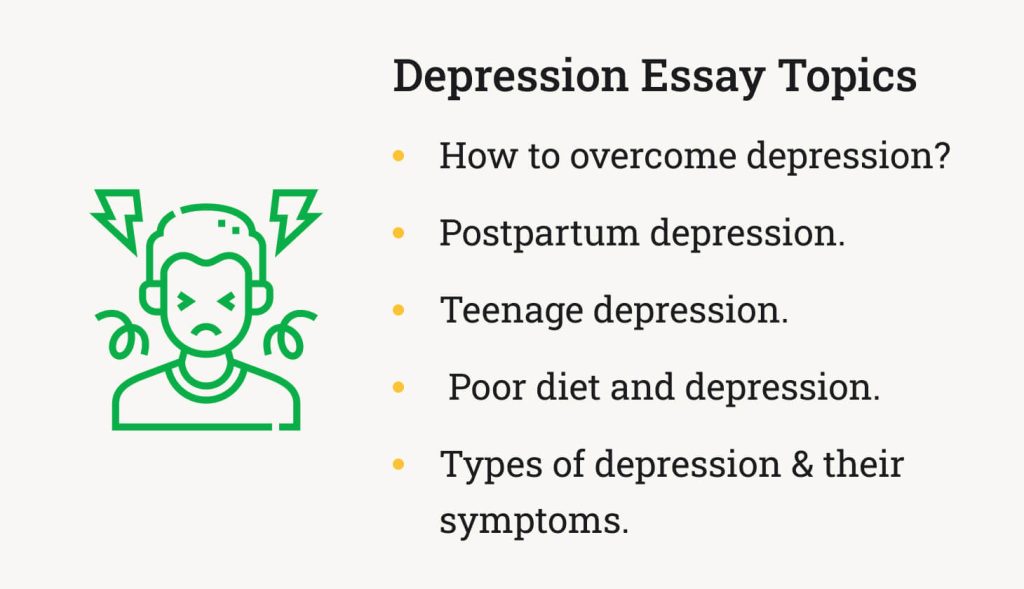
✅ Prompts for Essay about Depression
Struggling to find inspiration for your essay? Look no further! We’ve put together some valuable essay prompts on depression just for you!
Prompt for Personal Essay about Depression
Sharing your own experience with depression in a paper can be a good idea. Others may feel more motivated to overcome their situation after reading your story. You can also share valuable advice by discussing things or methods that have personally helped you deal with the condition.
For example, in your essay about depression, you can:
- Tell about the time you felt anxious, hopeless, or depressed;
- Express your opinion on depression based on the experiences from your life;
- Suggest a way of dealing with the initial symptoms of depression ;
- Share your ideas on how to protect mental health at a young age.
How to Overcome Depression: Essay Prompt
Sadness is a common human emotion, but depression encompasses more than just sadness. As reported by the National Institute of Mental Health, around 21 million adults in the United States, roughly 8.4% of the total adult population , faced at least one significant episode of depression in 2020. When crafting your essay about overcoming depression, consider exploring the following aspects:
- Depression in young people and adolescents;
- The main causes of depression;
- The symptoms of depression;
- Ways to treat depression;
- Help from a psychologist (cognitive behavioral therapy or interpersonal therapy ).
Postpartum Depression: Essay Prompt
The birth of a child often evokes a spectrum of powerful emotions, spanning from exhilaration and happiness to apprehension and unease. It can also trigger the onset of depression. Following childbirth, many new mothers experience postpartum “baby blues,” marked by shifts in mood, bouts of tears, anxiety, and sleep disturbances. To shed light on the subject of postpartum depression, explore the following questions:
- What factors may increase the risk of postpartum depression?
- Is postpartum depression predictable?
- How to prevent postpartum depression?
- What are the symptoms of postpartum depression?
- What kinds of postpartum depression treatments exist?
Prompt for Essay about Teenage Depression
Teenage depression is a mental health condition characterized by sadness and diminishing interest in daily activities. It can significantly impact a teenager’s thoughts, emotions, and behavior, often requiring long-term treatment and support.
By discussing the primary symptoms of teenage depression in your paper, you can raise awareness of the issue and encourage those in need to seek assistance. You can pay attention to the following aspects:
- Emotional changes (feelings of sadness, anger, hopelessness, guilt, etc.);
- Behavioral changes (loss of energy and appetite , less attention to personal hygiene, self-harm, etc.);
- New addictions (drugs, alcohol, computer games, etc.).
💡 Research Topics about Depression
- The role of genetics in depression development.
- The effectiveness of different psychotherapeutic interventions for depression.
- Anti-depression non-pharmacological and medication treatment .
- The impact of childhood trauma on the onset of depression later in life.
- Exploring the efficacy of antidepressant medication in different populations.
- The impact of exercise on depression symptoms and treatment outcomes.
- Mild depression: pharmacotherapy and psychotherapy .
- The relationship between sleep disturbances and depression.
- The role of gut microbiota in depression and potential implications for treatment.
- Investigating the impact of social media on depression rates in adolescents.
- Depression, dementia, and delirium in older people .
- The efficacy of cognitive-behavioral therapy in preventing depression relapse.
- The influence of hormonal changes on depression risk.
- Assessing the effectiveness of self-help and digital interventions for depression.
- Herbal and complementary therapies for depression .
- The relationship between personality traits and vulnerability to depression.
- Investigating the long-term consequences of untreated depression on physical health.
- Exploring the link between chronic pain and depression.
- Depression in the elderly male .
- The impact of childhood experiences on depression outcomes in adulthood.
- The use of ketamine and other novel treatments for depression.
- The effect of stigma on depression diagnosis and treatment.
- The conducted family assessment: cases of depression .
- The role of social support in depression recovery.
- The effectiveness of online support groups for individuals with depression.
- Depression and cognitive decline in adults.
- Depression: PICOT question component exploration .
- Exploring the impact of nutrition and dietary patterns on depression symptoms.
- Investigating the efficacy of art-based therapies in depression treatment.
- The role of neuroplasticity in the development and treatment of depression.
- Depression among HIV-positive women .
- The influence of gender on depression prevalence and symptomatology.
- Investigating the impact of workplace factors on depression rates and outcomes.
- The efficacy of family-based interventions in reducing depression symptoms in teenagers.
- Frontline nurses’ burnout, anxiety, depression, and fear statuses .
- The role of early-life stress and adversity in depression vulnerability.
- The impact of various environmental factors on depression rates.
- Exploring the link between depression and cardiovascular health .
- Depression detection in adults in nursing practice .
- Virtual reality as a therapeutic tool for depression treatment.
- Investigating the impact of childhood bullying on depression outcomes.
- The benefits of animal-assisted interventions in depression management.
- Depression and physical exercise .
- The relationship between depression and suicidal behavior .
- The influence of cultural factors on depression symptom expression.
- Investigating the role of epigenetics in depression susceptibility.
- Depression associated with cognitive dysfunction .
- Exploring the impact of adverse trauma on the course of depression.
- The efficacy of acceptance and commitment therapy in treating depression.
- The relationship between depression and substance use disorders .
- Depression and anxiety among college students .
- Investigating the effectiveness of group therapy for depression.
- Depression and chronic medical conditions .
Psychology Research Topics on Depression
- The influence of early attachment experiences on the development of depression.
- The impact of negative cognitive biases on depression symptomatology.
- Depression treatment plan for a queer patient .
- Examining the relationship between perfectionism and depression.
- The role of self-esteem in depression vulnerability and recovery.
- Exploring the link between maladaptive thinking styles (e.g., rumination, catastrophizing) and depression.
- Investigating the impact of social support on depression outcomes and resilience.
- Identifying depression in young adults at an early stage .
- The influence of parenting styles on the risk of depression in children and adolescents.
- The role of self-criticism and self-compassion in depression treatment.
- Exploring the relationship between identity development and depression in emerging adulthood.
- The role of learned helplessness in understanding depression and its treatment.
- Depression in the elderly .
- Examining the connection between self-efficacy beliefs and depression symptoms.
- The influence of social comparison processes on depression and body image dissatisfaction .
- Exploring the impact of trauma-related disorders on depression.
- The role of resilience factors in buffering against the development of depression.
- Investigating the relationship between personality traits and depression.
- Depression and workplace violence .
- The impact of cultural factors on depression prevalence and symptom presentation.
- Investigating the effects of chronic stress on depression risk.
- The role of coping strategies in depression management and recovery.
- The correlation between discrimination/prejudice and depression/anxiety .
- Exploring the influence of gender norms and societal expectations on depression rates.
- The impact of adverse workplace conditions on employee depression.
- Investigating the effectiveness of narrative therapy in treating depression.
- Cognitive behavior and depression in adolescents .
- Childhood emotional neglect and adult depression.
- The influence of perceived social support on treatment outcomes in depression.
- The effects of childhood bullying on the development of depression.
- The impact of intergenerational transmission of depression within families.
- Depression in children: symptoms and treatments .
- Investigating the link between body dissatisfaction and depression in adolescence.
- The influence of adverse life events and chronic stressors on depression risk.
- The effects of peer victimization on the development of depression in adolescence.
- Counselling clients with depression and addiction .
- The role of experiential avoidance in depression and its treatment.
- The impact of social media use and online interactions on depression rates.
- Depression management in adolescent .
- Exploring the relationship between emotional intelligence and depression symptomatology.
- Investigating the influence of cultural values and norms on depression stigma and help-seeking behavior.
- The effects of childhood maltreatment on neurobiological markers of depression.
- Psychological and emotional conditions of suicide and depression .
- Exploring the relationship between body dissatisfaction and depression.
- The influence of self-worth contingencies on depression vulnerability and treatment response.
- The impact of social isolation and loneliness on depression rates.
- Psychology of depression among college students .
- The effects of perfectionistic self-presentation on depression in college students.
- The role of mindfulness skills in depression prevention and relapse prevention.
- Investigating the influence of adverse neighborhood conditions on depression risk.
- Personality psychology and depression .
- The impact of attachment insecurity on depression symptomatology.
Postpartum Depression Research Topics
- Identifying risk factors for postpartum depression.
- Exploring the role of hormonal changes in postpartum depression.
- “Baby blues” or postpartum depression and evidence-based care .
- The impact of social support on postpartum depression.
- The effectiveness of screening tools for early detection of postpartum depression.
- The relationship between postpartum depression and maternal-infant bonding .
- Postpartum depression educational program results .
- Identifying effective interventions for preventing and treating postpartum depression.
- Examining the impact of cultural factors on postpartum depression rates.
- Investigating the role of sleep disturbances in postpartum depression.
- Depression and postpartum depression relationship .
- Exploring the impact of a traumatic birth experience on postpartum depression.
- Assessing the impact of breastfeeding difficulties on postpartum depression.
- Understanding the role of genetic factors in postpartum depression.
- Postpartum depression: consequences .
- Investigating the impact of previous psychiatric history on postpartum depression risk.
- The potential benefits of exercise on postpartum depression symptoms.
- The efficacy of psychotherapeutic interventions for postpartum depression.
- Postpartum depression in the twenty-first century .
- The influence of partner support on postpartum depression outcomes.
- Examining the relationship between postpartum depression and maternal self-esteem.
- The impact of postpartum depression on infant development and well-being.
- Maternal mood symptoms in pregnancy and postpartum depression .
- The effectiveness of group therapy for postpartum depression management.
- Identifying the role of inflammation and immune dysregulation in postpartum depression.
- Investigating the impact of childcare stress on postpartum depression.
- Postpartum depression among low-income US mothers .
- The role of postnatal anxiety symptoms in postpartum depression.
- The impact of postpartum depression on the marital relationship.
- The influence of postpartum depression on parenting practices and parental stress.
- Postpartum depression: symptoms, role of cultural factors, and ways to support .
- Investigating the efficacy of pharmacological treatments for postpartum depression.
- The impact of postpartum depression on breastfeeding initiation and continuation.
- The relationship between postpartum depression and post-traumatic stress disorder .
- Postpartum depression and its identification .
- The impact of postpartum depression on cognitive functioning and decision-making.
- Investigating the influence of cultural norms and expectations on postpartum depression rates.
- The impact of maternal guilt and shame on postpartum depression symptoms.
- Beck’s postpartum depression theory: purpose, concepts, and significance .
- Understanding the role of attachment styles in postpartum depression vulnerability.
- Investigating the effectiveness of online support groups for women with postpartum depression.
- The impact of socioeconomic factors on postpartum depression prevalence.
- Perinatal depression: research study and design .
- The efficacy of mindfulness-based interventions for postpartum depression.
- Investigating the influence of birth spacing on postpartum depression risk.
- The role of trauma history in postpartum depression development.
- The link between the birth experience and postnatal depression .
- How does postpartum depression affect the mother-infant interaction and bonding ?
- The effectiveness of home visiting programs in preventing and managing postpartum depression.
- Assessing the influence of work-related stress on postpartum depression.
- The relationship between postpartum depression and pregnancy-related complications.
- The role of personality traits in postpartum depression vulnerability.
🔎 Depression Essay Titles
Depression essay topics: cause & effect.
- The effects of childhood trauma on the development of depression in adults.
- The impact of social media usage on the prevalence of depression in adolescents.
- “Predictors of Postpartum Depression” by Katon et al.
- The effects of environmental factors on depression rates.
- The relationship between academic pressure and depression among college students.
- The relationship between financial stress and depression.
- The best solution to predict depression because of bullying .
- How does long-term unemployment affect mental health ?
- The effects of unemployment on mental health, particularly the risk of depression.
- The impact of genetics and family history of depression on an individual’s likelihood of developing depression.
- The relationship between depression and substance abuse .
- Child abuse and depression .
- The role of gender in the manifestation and treatment of depression.
- The effects of chronic stress on the development of depression.
- The link between substance abuse and depression.
- Depression among students at Elon University .
- The influence of early attachment styles on an individual’s vulnerability to depression.
- The effects of sleep disturbances on the severity of depression.
- Chronic illness and the risk of developing depression.
- Depression: symptoms and treatment .
- Adverse childhood experiences and the likelihood of experiencing depression in adulthood.
- The relationship between chronic illness and depression.
- The role of negative thinking patterns in the development of depression.
- Effects of depression among adolescents .
- The effects of poor body image and low self-esteem on the prevalence of depression.
- The influence of social support systems on preventing symptoms of depression.
- The effects of child neglect on adult depression rates.
- Depression caused by hormonal imbalance .
- The link between perfectionism and the risk of developing depression.
- The effects of a lack of sleep on depression symptoms.
- The effects of childhood abuse and neglect on the risk of depression.
- Social aspects of depression and anxiety .
- The impact of bullying on the likelihood of experiencing depression.
- The role of serotonin and neurotransmitter imbalances in the development of depression.
- The impact of a poor diet on depression rates.
- Depression and anxiety run in the family .
- The effects of childhood poverty and socioeconomic status on depression rates in adults.
- The impact of divorce on depression rates.
- The relationship between traumatic life events and the risk of developing depression.
- The influence of personality traits on susceptibility to depression.
- The impact of workplace stress on depression rates.
- Depression in older adults: causes and treatment .
- The impact of parental depression on children’s mental health outcomes.
- The effects of social isolation on the prevalence and severity of depression.
- The role of cultural factors in the manifestation and treatment of depression.
- The relationship between childhood bullying victimization and future depressive symptoms.
- The impact of early intervention and prevention programs on reducing the risk of postpartum depression.
- Treating mood disorders and depression .
- How do hormonal changes during pregnancy contribute to the development of depression?
- The effects of sleep deprivation on the onset and severity of postpartum depression.
- The impact of social media on depression rates among teenagers.
- The role of genetics in the development of depression.
- The impact of bullying on adolescent depression rates.
- Mental illness, depression, and wellness issues .
- The effects of a sedentary lifestyle on depression symptoms.
- The correlation between academic pressure and depression in students.
- The relationship between perfectionism and depression.
- The correlation between trauma and depression in military veterans.
- Anxiety and depression during childhood and adolescence .
- The impact of racial discrimination on depression rates among minorities.
- The relationship between chronic pain and depression.
- The impact of social comparison on depression rates among young adults.
- The effects of childhood abuse on adult depression rates.
Depression Argumentative Essay Topics
- The role of social media in contributing to depression among teenagers.
- The effectiveness of antidepressant medication: an ongoing debate.
- Depression treatment: therapy or medications ?
- Should depression screening be mandatory in schools and colleges?
- Is there a genetic predisposition to depression?
- The stigma surrounding depression: addressing misconceptions and promoting understanding.
- Implementation of depression screening in primary care .
- Is psychotherapy more effective than medication in treating depression?
- Is teenage depression overdiagnosed or underdiagnosed: a critical analysis.
- The connection between depression and substance abuse: untangling the relationship.
- Humanistic therapy of depression .
- Should ECT (electroconvulsive therapy) be a treatment option for severe depression?
- Where is depression more prevalent: in urban or rural communities? Analyzing the disparities.
- Is depression a result of chemical imbalance in the brain? Debunking the myth.
- Depression: a serious mental and behavioral problem .
- Should depression medication be prescribed for children and adolescents?
- The effectiveness of mindfulness-based interventions in managing depression.
- Should depression in the elderly be considered a normal part of aging?
- Is depression hereditary? Investigating the role of genetics in depression risk.
- Different types of training in managing the symptoms of depression .
- The effectiveness of online therapy platforms in treating depression.
- Should psychedelic therapy be explored as an alternative treatment for depression?
- The connection between depression and cardiovascular health: Is there a link?
- The effectiveness of cognitive-behavioral therapy in preventing depression relapse.
- Depression as a bad a clinical condition .
- Should mind-body interventions (e.g., yoga , meditation) be integrated into depression treatment?
- Should emotional support animals be prescribed for individuals with depression?
- The effectiveness of peer support groups in decreasing depression symptoms.
- The use of antidepressants: are they overprescribed or necessary for treating depression?
- Adult depression and anxiety as a complex problem .
- The effectiveness of therapy versus medication in treating depression.
- The stigma surrounding depression and mental illness: how can we reduce it?
- The debate over the legalization of psychedelic drugs for treating depression.
- The relationship between creativity and depression: does one cause the other?
- Cognitive-behavioral therapy for generalized anxiety disorder and depression .
- The role of childhood trauma in shaping adult depression: Is it always a causal factor?
- The debate over the medicalization of sadness and grief as forms of depression.
- Alternative therapies, such as acupuncture or meditation, are effective in treating depression.
- Depression as a widespread mental condition .
Controversial Topics about Depression
- The existence of “chemical imbalance” in depression: fact or fiction?
- The over-reliance on medication in treating depression: are alternatives neglected?
- Is depression overdiagnosed and overmedicated in Western society?
- Measurement of an individual’s level of depression .
- The role of Big Pharma in shaping the narrative and treatment of depression.
- Should antidepressant advertisements be banned?
- The inadequacy of current diagnostic criteria for depression: rethinking the DSM-5.
- Is depression a biological illness or a product of societal factors?
- Literature review on depression .
- The overemphasis on biological factors in depression treatment: ignoring environmental factors.
- Is depression a normal reaction to an abnormal society?
- The influence of cultural norms on the perception and treatment of depression.
- Should children and adolescents be routinely prescribed antidepressants?
- The role of family in depression treatment .
- The connection between depression and creative genius: does depression enhance artistic abilities?
- The ethics of using placebo treatment for depression studies.
- The impact of social and economic inequalities on depression rates.
- Is depression primarily a mental health issue or a social justice issue?
- Depression disassembling and treating .
- Should depression screening be mandatory in the workplace?
- The influence of gender bias in the diagnosis and treatment of depression.
- The controversial role of religion and spirituality in managing depression.
- Is depression a result of individual weakness or societal factors?
- Abnormal psychology: anxiety and depression case .
- The link between depression and obesity: examining the bidirectional relationship.
- The connection between depression and academic performance : causation or correlation?
- Should depression medication be available over the counter?
- The impact of internet and social media use on depression rates: harmful or beneficial?
- Interacting in the workplace: depression .
- Is depression a modern epidemic or simply better diagnosed and identified?
- The ethical considerations of using animals in depression research.
- The effectiveness of psychedelic therapies for treatment-resistant depression.
- Is depression a disability? The debate on workplace accommodations.
- Polysubstance abuse among adolescent males with depression .
- The link between depression and intimate partner violence : exploring the relationship.
- The controversy surrounding “happy” pills and the pursuit of happiness.
- Is depression a choice? Examining the role of personal responsibility.
Good Titles for Depression Essays
- The poetic depictions of depression: exploring its representation in literature.
- The melancholic symphony: the influence of depression on classical music.
- Moderate depression symptoms and treatment .
- Depression in modern music: analyzing its themes and expressions.
- Cultural perspectives on depression: a comparative analysis of attitudes in different countries.
- Contrasting cultural views on depression in Eastern and Western societies.
- Diagnosing depression in the older population .
- The influence of social media on attitudes and perceptions of depression in global contexts.
- Countries with progressive approaches to mental health awareness.
- From taboo to acceptance: the evolution of attitudes towards depression.
- Depression screening tool in acute settings .
- The Bell Jar : analyzing Sylvia Plath’s iconic tale of depression .
- The art of despair: examining Frida Kahlo’s self-portraits as a window into depression.
- The Catcher in the Rye : Holden Caulfield’s battle with adolescent depression.
- Music as therapy: how jazz artists turned depression into art.
- Depression screening tool for a primary care center .
- The Nordic paradox: high depression rates in Scandinavian countries despite high-quality healthcare.
- The Stoic East: how Eastern philosophies approach and manage depression.
- From solitude to solidarity: collective approaches to depression in collectivist cultures.
- The portrayal of depression in popular culture: a critical analysis of movies and TV shows.
- The depression screening training in primary care .
- The impact of social media influencers on depression rates among young adults.
- The role of music in coping with depression: can specific genres or songs help alleviate depressive symptoms?
- The representation of depression in literature: a comparative analysis of classic and contemporary works.
- The use of art as a form of self-expression and therapy for individuals with depression.
- Depression management guidelines implementation .
- The role of religion in coping with depression: Christian and Buddhist practices.
- The representation of depression in the video game Hellblade: Senua’s Sacrifice .
- The role of nature in coping with depression: can spending time outdoors help alleviate depressive symptoms?
- The effectiveness of dance/movement therapy in treating depression among older adults.
- The National Institute for Health: depression management .
- The portrayal of depression in stand-up comedy: a study of comedians like Maria Bamford and Chris Gethard.
- The role of spirituality in coping with depression: Islamic and Hindu practices .
- The portrayal of depression in animated movies : an analysis of Inside Out and The Lion King .
- The representation of depression by fashion designers like Alexander McQueen and Rick Owens.
- Depression screening in primary care .
- The portrayal of depression in documentaries: an analysis of films like The Bridge and Happy Valley .
- The effectiveness of wilderness therapy in treating depression among adolescents.
- The connection between creativity and depression: how art can help heal.
- The role of Buddhist and Taoist practices in coping with depression.
- Mild depression treatment research funding sources .
- The portrayal of depression in podcasts: an analysis of the show The Hilarious World of Depression .
- The effectiveness of drama therapy in treating depression among children and adolescents.
- The representation of depression in the works of Vincent van Gogh and Edvard Munch.
- Depression in young people: articles review .
- The impact of social media on political polarization and its relationship with depression.
- The role of humor in coping with depression: a study of comedians like Ellen DeGeneres.
- The portrayal of depression in webcomics: an analysis of the comics Hyperbole and a Half .
- The effect of social media on mental health stigma and its relationship with depression.
- Depression and the impact of human services workers .
- The masked faces: hiding depression in highly individualistic societies.
💭 Depression Speech Topics
Informative speech topics about depression.
- Different types of depression and their symptoms.
- The causes of depression: biological, psychological, and environmental factors.
- How depression and physical issues are connected .
- The prevalence of depression in different age groups and demographics.
- The link between depression and anxiety disorders .
- Physical health: The effects of untreated depression.
- The role of genetics in predisposing individuals to depression.
- What you need to know about depression .
- How necessary is early intervention in treating depression?
- The effectiveness of medication in treating depression.
- The role of exercise in managing depressive symptoms.
- Depression in later life: overview .
- The relationship between substance abuse and depression.
- The impact of trauma on depression rates and treatment.
- The effectiveness of mindfulness meditation in managing depressive symptoms.
- Enzymes conversion and metabolites in major depression .
- The benefits and drawbacks of electroconvulsive therapy for severe depression.
- The effect of gender and cultural norms on depression rates and treatment.
- The effectiveness of alternative therapies for depression, such as acupuncture and herbal remedies .
- The importance of self-care in managing depression.
- Symptoms of anxiety, depression, and peritraumatic dissociation .
- The role of support systems in managing depression.
- The effectiveness of cognitive-behavioral therapy in treating depression.
- The benefits and drawbacks of online therapy for depression.
- The role of spirituality in managing depression.
- Depression among minority groups .
- The benefits and drawbacks of residential treatment for severe depression.
- What is the relationship between childhood trauma and adult depression?
- How effective is transcranial magnetic stimulation (TMS) for treatment-resistant depression?
- The benefits and drawbacks of art therapy for depression.
- Mood disorder: depression and bipolar .
- The impact of social media on depression rates.
- The effectiveness of dialectical behavior therapy (DBT) in treating depression.
- Depression in older people .
- The impact of seasonal changes on depression rates and treatment options.
- The impact of depression on daily life and relationships, and strategies for coping with the condition.
- The stigma around depression and the importance of seeking help.
Persuasive Speech Topics about Depression
- How important is it to recognize the signs and symptoms of depression ?
- How do you support a loved one who is struggling with depression?
- The importance of mental health education in schools to prevent and manage depression.
- Social media: the rise of depression and anxiety .
- Is there a need to increase funding for mental health research to develop better treatments for depression?
- Addressing depression in minority communities: overcoming barriers and disparities.
- The benefits of including alternative therapies , such as yoga and meditation, in depression treatment plans.
- Challenging media portrayals of depression: promoting accurate representations.
- Two sides of depression disease .
- How social media affects mental health: the need for responsible use to prevent depression.
- The importance of early intervention: addressing depression in schools and colleges.
- The benefits of seeking professional help for depression.
- There is a need for better access to mental health care, including therapy and medication, for those suffering from depression.
- Depression in adolescents and suitable interventions .
- How do you manage depression while in college or university?
- The role of family and friends in supporting loved ones with depression and encouraging them to seek help.
- The benefits of mindfulness and meditation for depression.
- The link between sleep and depression, and how to improve sleep habits.
- How do you manage depression while working a high-stress job?
- Approaches to treating depression .
- How do you manage depression during pregnancy and postpartum?
- The importance of prioritizing employee mental health and providing resources for managing depression in the workplace.
- How should you manage depression while caring for a loved one with a chronic illness?
- How to manage depression while dealing with infertility or pregnancy loss.
- Andrew Solomon: why we can’t talk about depression .
- Destigmatizing depression: promoting mental health awareness and understanding.
- Raising funds for depression research: investing in mental health advances.
- The power of peer support: establishing peer-led programs for depression.
- Accessible mental health services: ensuring treatment for all affected by depression.
- Evidence-based screening for depression in acute care .
- The benefits of journaling for mental health: putting your thoughts on paper to heal.
- The power of positivity: changing your mindset to fight depression .
- The healing power of gratitude in fighting depression.
- The connection between diet and depression: eating well can improve your mood.
- Teen depression and suicide in Soto’s The Afterlife .
- The benefits of therapy for depression: finding professional help to heal.
- The importance of setting realistic expectations when living with depression.
📝 How to Write about Depression: Essay Structure
We’ve prepared some tips and examples to help you structure your essay and communicate your ideas.
Essay about Depression: Introduction
An introduction is the first paragraph of an essay. It plays a crucial role in engaging the reader, offering the context, and presenting the central theme.
A good introduction typically consists of 3 components:
- Hook. The hook captures readers’ attention and encourages them to continue reading.
- Background information. Background information provides context for the essay.
- Thesis statement. A thesis statement expresses the essay’s primary idea or central argument.
Hook : Depression is a widespread mental illness affecting millions worldwide.
Background information : Depression affects your emotions, thoughts, and behavior. If you suffer from depression, engaging in everyday tasks might become arduous, and life may appear devoid of purpose or joy.
Depression Essay Thesis Statement
A good thesis statement serves as an essay’s road map. It expresses the author’s point of view on the issue in 1 or 2 sentences and presents the main argument.
Thesis statement : The stigma surrounding depression and other mental health conditions can discourage people from seeking help, only worsening their symptoms.
Essays on Depression: Body Paragraphs
The main body of the essay is where you present your arguments. An essay paragraph includes the following:
- a topic sentence,
- evidence to back up your claim,
- explanation of why the point is essential to the argument;
- a link to the next paragraph.
Topic sentence : Depression is a complex disorder that requires a personalized treatment approach, comprising both medication and therapy.
Evidence : Medication can be prescribed by a healthcare provider or a psychiatrist to relieve the symptoms. Additionally, practical strategies for managing depression encompass building a support system, setting achievable goals, and practicing self-care.
Depression Essay: Conclusion
The conclusion is the last part of your essay. It helps you leave a favorable impression on the reader.
The perfect conclusion includes 3 elements:
- Rephrased thesis statement.
- Summary of the main points.
- Final opinion on the topic.
Rephrased thesis: In conclusion, overcoming depression is challenging because it involves a complex interplay of biological, psychological, and environmental factors that affect an individual’s mental well-being.
Summary: Untreated depression heightens the risk of engaging in harmful behaviors such as substance abuse and can also result in negative thought patterns, diminished self-esteem, and distorted perceptions of reality.
We hope you’ve found our article helpful and learned some new information. If so, feel free to share it with your friends. You can also try our free online topic generator !
- Pain, anxiety, and depression – Harvard Health | Harvard Health Publishing
- Depression-related increases and decreases in appetite reveal dissociable patterns of aberrant activity in reward and interoceptive neurocircuitry – PMC | National Library of Medicine
- How to Get Treatment for Postpartum Depression – The New York Times
- What Is Background Information and What Purpose Does It Serve? | Indeed.com
- Thesis | Harvard College Writing Center
- Topic Sentences: How Do You Write a Great One? | Grammarly Blog
725 Research Proposal Topics & Title Ideas in Education, Psychology, Business, & More
414 proposal essay topics for projects, research, & proposal arguments.
COMM101: Public Speaking (2015.A.01)
Informative speech about depression in college students.
Watch this example of an informative speech. Pay attention to the speech's structure, how it forecasts main points, and how the speaker cites their sources. Using what you have learned, evaluate the successes and flaws of this presentation.
A collection of TED Talks (and more) on the topic of Depression.
Video playlists about Depression

Overcoming depression
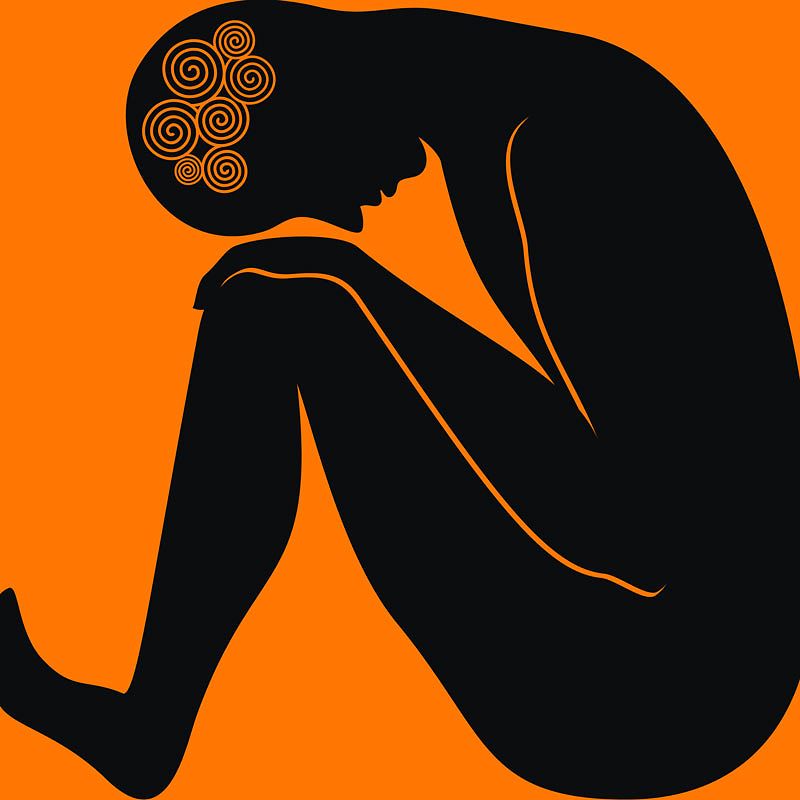
The struggle of mental health

All kinds of minds
Talks about depression.

How targeted ads might just save your life

Is someone you love suffering in silence? Here's what to do

Is it normal to talk to yourself?

3 steps of anxiety overload — and how you can take back control

4 signs of emotional abuse

On masculinity and mental health

A new way to help young people with their mental health
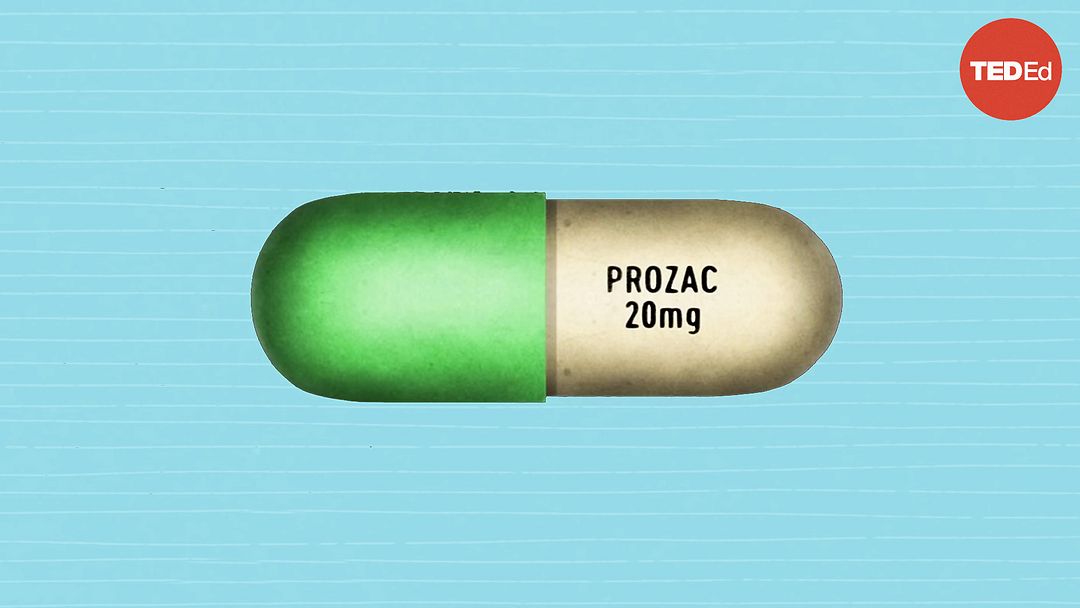
How do antidepressants work?

Should we cry at work?

What's that ringing in your ears?

A video game that helps us understand loneliness

The lifetime stakes of teen mental health

This could be why you're depressed or anxious

The future of psychedelic-assisted psychotherapy

"Three Months After"
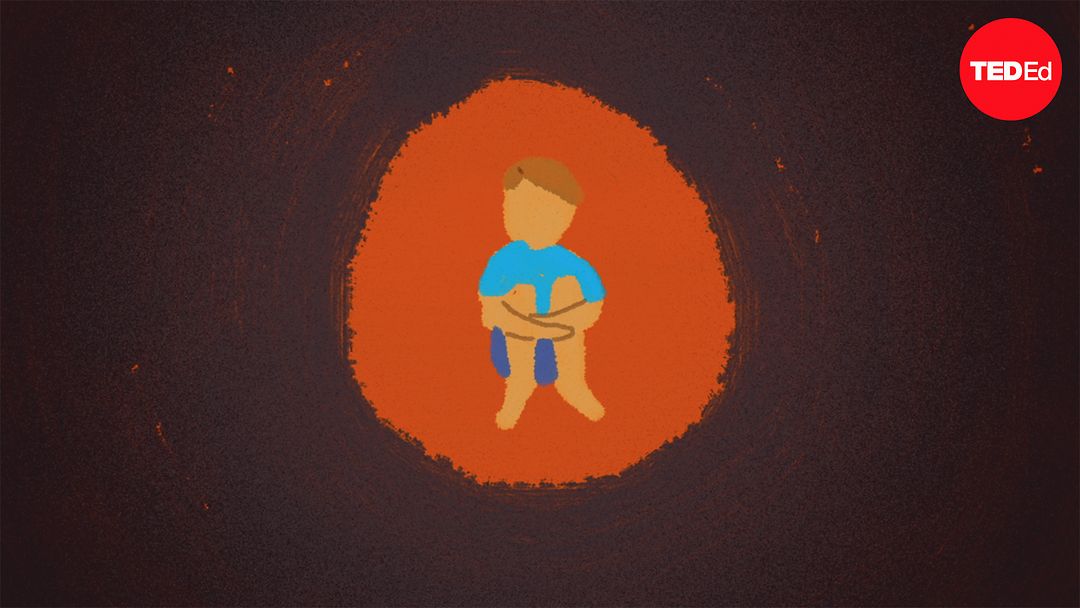
"The Nutritionist"
Exclusive articles about depression, a scientist explores: what if we could inoculate people against depression and trauma, one way to calm an anxious mind: notice when you’re doing ok, what can you do when you’re flattened by depression plan for it.
89 Postpartum Depression Essay Topic Ideas & Examples
🏆 best postpartum depression topic ideas & essay examples, 👍 most interesting postpartum depression topics to write about, ⭐ good research topics about postpartum depression, ❓ postpartum depression research questions.
- Activity During Pregnancy and Postpartum Depression Studies have shown that women’s mood and cardiorespiratory fitness improve when they engage in moderate-intensity physical activity in the weeks and months after giving birth to a child.
- Complementary Therapy for Postpartum Depression in Primary Care Thus, the woman faced frustration and sadness, preventing her from taking good care of the child, and the lack of support led to the emergence of concerns similar to those in the past. We will write a custom essay specifically for you by our professional experts 808 writers online Learn More
- Technology to Fight Postpartum Depression in African American Women I would like to introduce the app “Peanut” the social network designed to help and unite women exclusively, as a technology aimed at fighting postpartum depression in African American Women.
- The Postpartum Depression in Afro-Americans Policy The distribution of the funds is managed and administered on the state level. Minnesota and Maryland focused on passing the legislation regulating the adoption of Medicaid in 2013.
- Breastfeeding and Risk of Postpartum Depression The primary goal of the research conducted by Islam et al.was to analyze the correlation between exclusive breastfeeding and the risk of postpartum depression among new mothers.
- Postpartum Depression in African American Women As far as African American women are concerned, the issue becomes even more complex due to several reasons: the stigma associated with the mental health of African American women and the mental health complications that […]
- Postpartum Depression Among the Low-Income U.S. Mothers Mothers who take part in the programs develop skills and knowledge to use the existing social entities to ensure that they protect themselves from the undesirable consequences associated with the PPD and other related psychological […]
- In-Vitro Fertilization and Postpartum Depression The research was conducted through based on professional information sources and statistical data collected from the research study used to further validate the evidence and outcome of this study.
- Postpartum Depression and Its Impact on Infants The goal of this research was “to investigate the prevalence of maternal depressive symptoms at 5 and 9 months postpartum in a low-income and predominantly Hispanic sample, and evaluate the impact on infant weight gain, […]
- Postpartum Depression: Statistics and Methods of Diagnosis The incorporation of the screening tools into the existing electronic medical support system has proved to lead to positive outcomes for both mothers and children.
- Postpartum Psychosis: Impact on Family By the ties of kinship, the extended families of both parents are often intricately involved in the pregnancy and maybe major sources of support for the pregnant woman.
- Postpartum Depression: Treatment and Therapy It outlines the possible treatment and therapy methods, as well as the implications of the condition. A 28-year-old patient presented in the office three weeks after giving birth to her first son with the symptoms […]
- A Review of Postpartum Depression and Continued Post Birth Support In the first chapter – the introduction – the problem statement, background, purpose, and nature of the project are mentioned. The purpose of the project is to explain the significance of managing postpartum depression by […]
- Postpartum Depression: Understanding the Needs of Women This article also emphasizes the need to consider and assess the needs of the mother, infant as well as family members during the treatment of PPD.
- Postpartum Depression and Acute Depressive Symptoms It is hypothesized that the authors of the study wished to establish, with certainty, the effect of the proposed predictors for the development of PPD.
- Postpartum Depression and Its Peculiarities The major peculiarity of PPD in terms of its adverse effects is that it is detrimental to both the mother and the newborn child.
- Supporting the Health Needs of Patients With Parkinson’s, Preeclampsia, and Postpartum Depression The medical history of the patient will help the doctor to offer the best drug therapy. Members of the family might also be unable to cope with the disorder.
- Postpartum Depression and Comorbid Disorders For example, at a public hospital in Sydney, Australia, the psychiatrists used a Routine Comprehensive Psychosocial Assessment tool to study the chances of ‘low risk’ women developing the postpartum symptoms.
- Correlation Between Multiple Pregnancies and Postpartum Depression or Psychosis In recognition of the paucity of information on the relationship between multiple pregnancies and postpartum depression, the paper reviews the likely relationship by understanding the two variables, multiple pregnancies and postpartum depression, in terms of […]
- Acknowledging Postpartum Depression: Years Ago, There Was
- Postpartum Depression and Crime: The Case of Andrea Yates
- Baby Blues, Postpartum Depression, and Postpartum Psychosis
- Postpartum Depression and Parent-Child Relationships
- Cheryl Postpartum Depression Theory Analysis
- Cognitive Therapy for Postpartum Depression
- Postpartum Depression: An Important Issue in Women’s Health
- The Relationships Between Depression and Postpartum Depression
- Postpartum Depression: Causes and Treatments
- How Postpartum Depression Predicts Emotional and Cognitive Difficulties in 11-Year-Olds
- Economic and Health Predictors of National Postpartum Depression Prevalence
- Postpartum Depression (PPD): Symptoms, Causes, and Treatment
- Fathers Dealing With Postpartum Depression
- Postpartum Depression and the Birth of a New Baby
- Risk of Postpartum Depression in Women Without Depression in Pregnancy
- Intimate Partner Violence During Pregnancy and Postpartum Depression in Japan
- Managing Postpartum Depression Through Medications and Therapy
- Early Identification Essential to Treat Postpartum Depression
- Screening for Postpartum Depression and Associated Factors Among Women in China
- Postpartum Depression and Anxiety Disorders in Women
- Postpartum Depression and Child Development
- Association Between Family Members and Risk of Postpartum Depression in Japan
- Postpartum Depression and Its Effects on Mental Health
- Baby Blues, the Challenges of Postpartum Depression
- How Postpartum Depression Affects Employment
- Postpartum Depression During the Postpartum Period
- Evidence-Based Interventions of Postpartum Depression
- Proposed Policy for Postpartum Depression Screening and Treatment
- Sleep Deprivation and Postpartum Depression
- The Causes and Effects of Postpartum Depression
- The Main Facts About Postpartum Depression
- The Postpartum Depression and Crime Relations
- Sleep Quality and Mothers With Postpartum Depression
- Postpartum Depression and Its Effects on Early Brain
- Fetal Gender and Postpartum Depression in a Cohort of Chinese Women
- Postpartum Depression and Postnatal Depression Psychology
- The Problem of Postpartum Depression Among Canadian Women
- Postpartum Depression and Its Effect on the Family Experience
- Mothers With Postpartum Depression for Breastfeeding Success
- Postpartum Depression and Analysis of Treatments and Health Determinants
- How Are Neuroactive Steroids Related to Major Depressive Disorder and Postpartum Depression?
- What Are the Emotional and Behavioral Changes During Postpartum Depression?
- Does Postpartum Depression Affect the Child’s Development?
- When Does Postpartum Depression Lead to Psychosis?
- How to Recognize Postpartum Depression?
- What Is the Role of the Mother, Child, and Partner in Postpartum Depression?
- Is There an Association Between Family Members and the Risk of Postpartum Depression in Japan?
- What Are the Most Common Signs of Postpartum Depression?
- How Does Postpartum Depression Affect Parent-Child Relationships?
- What Type of Therapy Is Most Widely Used for a Person Suffering from Postpartum Depression?
- Can Postpartum Depression Cause Autism?
- What Is a Gender Perspective on Postpartum Depression and the Social Construction of Motherhood?
- How Are Postpartum Depression and Related Factors Screened Among Women in China?
- What Are the Economic and Medical Projections of the Prevalence of Postpartum Depression?
- Is There a Difference Between Postnatal and Postpartum Depression?
- What Is the Biggest Risk Factor for Postpartum Depression?
- How Are Fetal Gender and Postpartum Depression Related in a Cohort of Chinese Women?
- What Factors Contribute to the Development of Postpartum Depression?
- Is Postpartum Depression a Long-Term Disability?
- What Are the Causes and Consequences of Postpartum Depression?
- How Is Postpartum Depression Diagnosed?
- What Is Postpartum Depression and How Does It Affect Newborns and Mothers?
- Is Psychotherapy the Best Treatment for Postpartum Depression?
- What Should Be the Knowledge of Nurses in the Diagnosis of Postpartum Depression?
- How Does Postpartum Depression Affect the Family Experience?
- What Is the Relationship Between Sleep Quality and Postpartum Depression in Mothers?
- Can Postpartum Depression Be Managed with Medication and Therapy?
- What Treatment Options Are Available for People with Postpartum Depression?
- How Long After Childbirth Can Postpartum Depression Occur?
- Are Physical Activity Interventions Effective in the Treatment of Postpartum Depression?
- Chicago (A-D)
- Chicago (N-B)
IvyPanda. (2023, September 20). 89 Postpartum Depression Essay Topic Ideas & Examples. https://ivypanda.com/essays/topic/postpartum-depression-essay-topics/
"89 Postpartum Depression Essay Topic Ideas & Examples." IvyPanda , 20 Sept. 2023, ivypanda.com/essays/topic/postpartum-depression-essay-topics/.
IvyPanda . (2023) '89 Postpartum Depression Essay Topic Ideas & Examples'. 20 September.
IvyPanda . 2023. "89 Postpartum Depression Essay Topic Ideas & Examples." September 20, 2023. https://ivypanda.com/essays/topic/postpartum-depression-essay-topics/.
1. IvyPanda . "89 Postpartum Depression Essay Topic Ideas & Examples." September 20, 2023. https://ivypanda.com/essays/topic/postpartum-depression-essay-topics/.
Bibliography
IvyPanda . "89 Postpartum Depression Essay Topic Ideas & Examples." September 20, 2023. https://ivypanda.com/essays/topic/postpartum-depression-essay-topics/.
- Parenting Research Topics
- Motherhood Ideas
- Mental Health Essay Ideas
- Stress Titles
- Depression Essay Topics
- Suicide Topics
- Cognitive Therapy Essay Topics
- Mental Disorder Essay Topics
- Abnormal Psychology Paper Topics
- Childhood Essay Topics
- Family Problems Questions
- Cognitive Psychology Topics
- Infant Research Topics
- Gender Stereotypes Essay Titles
- Psychoanalysis Essay Topics
Read our research on: Gun Policy | International Conflict | Election 2024
Regions & Countries
3. problems students are facing at public k-12 schools.
We asked teachers about how students are doing at their school. Overall, many teachers hold negative views about students’ academic performance and behavior.
- 48% say the academic performance of most students at their school is fair or poor; a third say it’s good and only 17% say it’s excellent or very good.
- 49% say students’ behavior at their school is fair or poor; 35% say it’s good and 13% rate it as excellent or very good.
Teachers in elementary, middle and high schools give similar answers when asked about students’ academic performance. But when it comes to students’ behavior, elementary and middle school teachers are more likely than high school teachers to say it’s fair or poor (51% and 54%, respectively, vs. 43%).
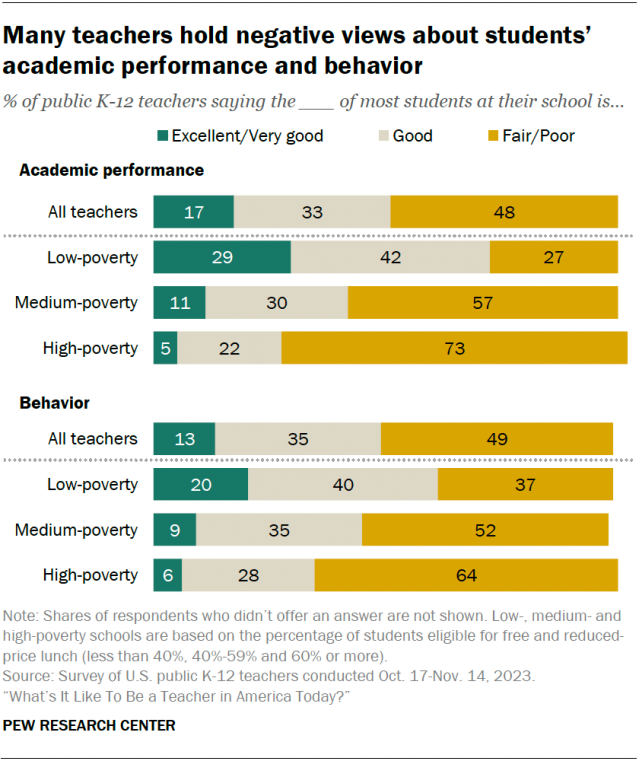
Teachers from high-poverty schools are more likely than those in medium- and low-poverty schools to say the academic performance and behavior of most students at their school are fair or poor.
The differences between high- and low-poverty schools are particularly striking. Most teachers from high-poverty schools say the academic performance (73%) and behavior (64%) of most students at their school are fair or poor. Much smaller shares of teachers from low-poverty schools say the same (27% for academic performance and 37% for behavior).
In turn, teachers from low-poverty schools are far more likely than those from high-poverty schools to say the academic performance and behavior of most students at their school are excellent or very good.
Lasting impact of the COVID-19 pandemic
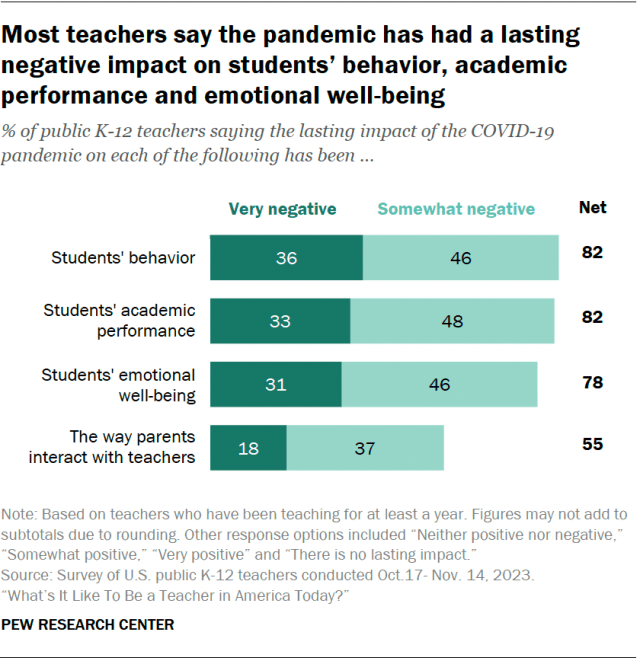
Among those who have been teaching for at least a year, about eight-in-ten teachers say the lasting impact of the pandemic on students’ behavior, academic performance and emotional well-being has been very or somewhat negative. This includes about a third or more saying that the lasting impact has been very negative in each area.
Shares ranging from 11% to 15% of teachers say the pandemic has had no lasting impact on these aspects of students’ lives, or that the impact has been neither positive nor negative. Only about 5% say that the pandemic has had a positive lasting impact on these things.
A smaller majority of teachers (55%) say the pandemic has had a negative impact on the way parents interact with teachers, with 18% saying its lasting impact has been very negative.
These results are mostly consistent across teachers of different grade levels and school poverty levels.
Major problems at school
When we asked teachers about a range of problems that may affect students who attend their school, the following issues top the list:
- Poverty (53% say this is a major problem at their school)
- Chronic absenteeism – that is, students missing a substantial number of school days (49%)
- Anxiety and depression (48%)
One-in-five say bullying is a major problem among students at their school. Smaller shares of teachers point to drug use (14%), school fights (12%), alcohol use (4%) and gangs (3%).
Differences by school level
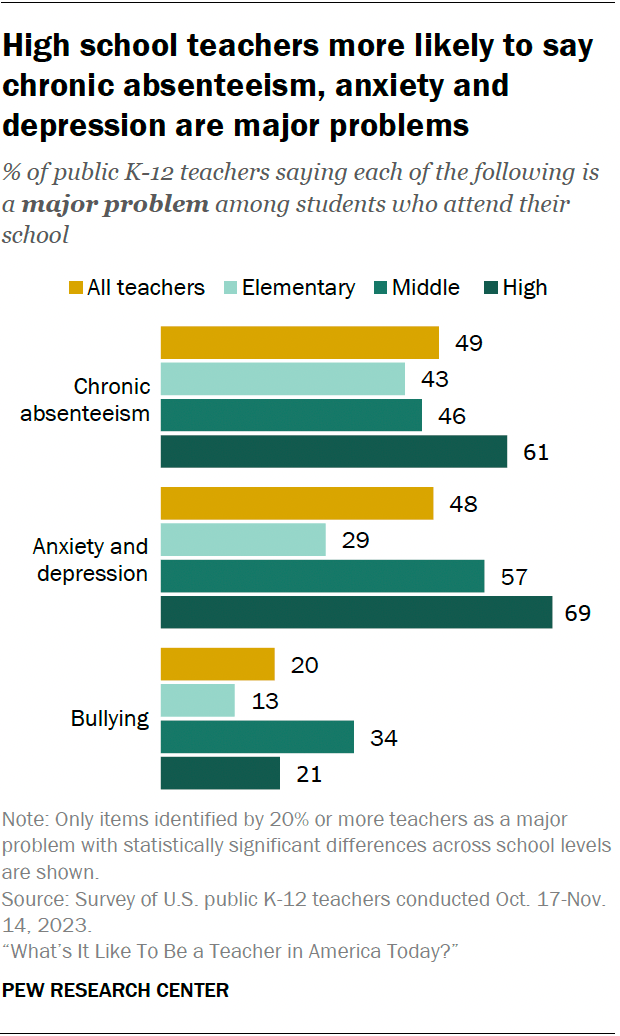
Similar shares of teachers across grade levels say poverty is a major problem at their school, but other problems are more common in middle or high schools:
- 61% of high school teachers say chronic absenteeism is a major problem at their school, compared with 43% of elementary school teachers and 46% of middle school teachers.
- 69% of high school teachers and 57% of middle school teachers say anxiety and depression are a major problem, compared with 29% of elementary school teachers.
- 34% of middle school teachers say bullying is a major problem, compared with 13% of elementary school teachers and 21% of high school teachers.
Not surprisingly, drug use, school fights, alcohol use and gangs are more likely to be viewed as major problems by secondary school teachers than by those teaching in elementary schools.
Differences by poverty level
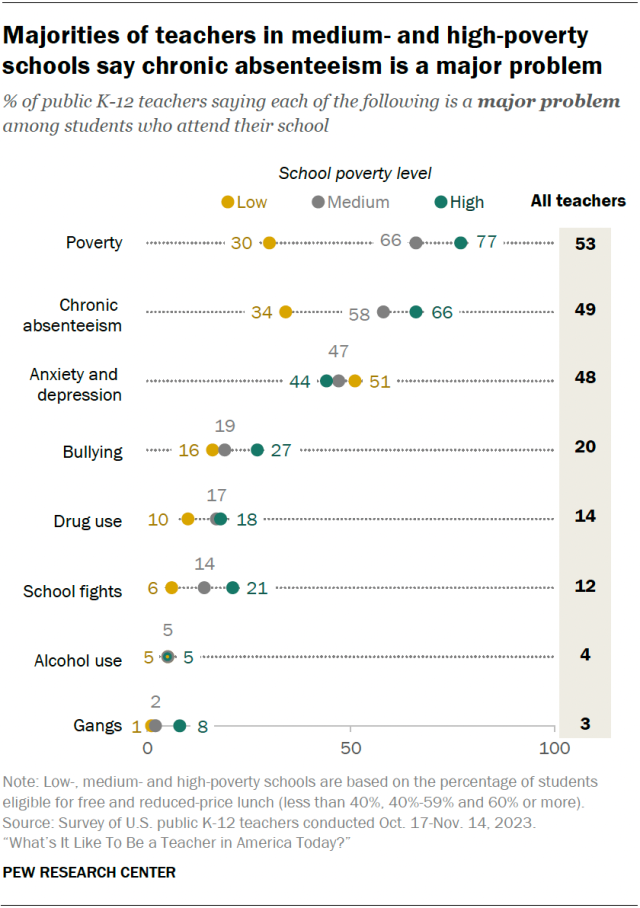
Teachers’ views on problems students face at their school also vary by school poverty level.
Majorities of teachers in high- and medium-poverty schools say chronic absenteeism is a major problem where they teach (66% and 58%, respectively). A much smaller share of teachers in low-poverty schools say this (34%).
Bullying, school fights and gangs are viewed as major problems by larger shares of teachers in high-poverty schools than in medium- and low-poverty schools.
When it comes to anxiety and depression, a slightly larger share of teachers in low-poverty schools (51%) than in high-poverty schools (44%) say these are a major problem among students where they teach.
Discipline practices
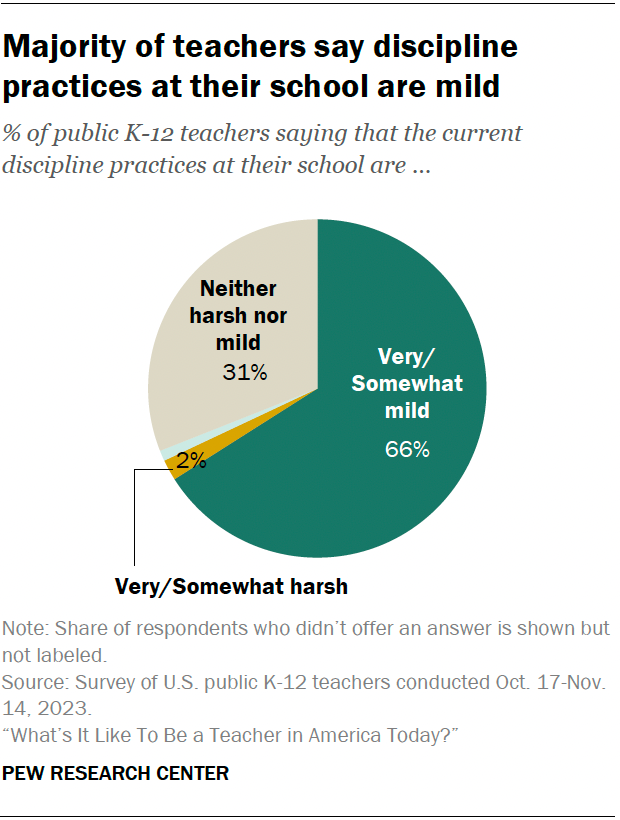
About two-thirds of teachers (66%) say that the current discipline practices at their school are very or somewhat mild – including 27% who say they’re very mild. Only 2% say the discipline practices at their school are very or somewhat harsh, while 31% say they are neither harsh nor mild.
We also asked teachers about the amount of influence different groups have when it comes to determining discipline practices at their school.
- 67% say teachers themselves don’t have enough influence. Very few (2%) say teachers have too much influence, and 29% say their influence is about right.
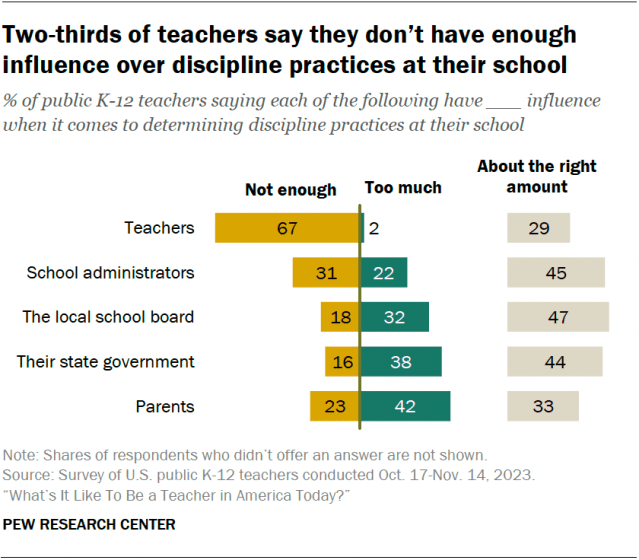
- 31% of teachers say school administrators don’t have enough influence, 22% say they have too much, and 45% say their influence is about right.
- On balance, teachers are more likely to say parents, their state government and the local school board have too much influence rather than not enough influence in determining discipline practices at their school. Still, substantial shares say these groups have about the right amount of influence.
Teachers from low- and medium-poverty schools (46% each) are more likely than those in high-poverty schools (36%) to say parents have too much influence over discipline practices.
In turn, teachers from high-poverty schools (34%) are more likely than those from low- and medium-poverty schools (17% and 18%, respectively) to say that parents don’t have enough influence.
Social Trends Monthly Newsletter
Sign up to to receive a monthly digest of the Center's latest research on the attitudes and behaviors of Americans in key realms of daily life
Report Materials
Table of contents, ‘back to school’ means anytime from late july to after labor day, depending on where in the u.s. you live, among many u.s. children, reading for fun has become less common, federal data shows, most european students learn english in school, for u.s. teens today, summer means more schooling and less leisure time than in the past, about one-in-six u.s. teachers work second jobs – and not just in the summer, most popular.
About Pew Research Center Pew Research Center is a nonpartisan fact tank that informs the public about the issues, attitudes and trends shaping the world. It conducts public opinion polling, demographic research, media content analysis and other empirical social science research. Pew Research Center does not take policy positions. It is a subsidiary of The Pew Charitable Trusts .
Get JTA's Daily Briefing in your inbox
I accept the JTA Privacy Policy .
By submitting the above I agree to the privacy policy and terms of use of JTA.org
Guernica editor who published Israeli writer’s coexistence essay resigns, saying she disagreed with retraction

( JTA ) – The editor-in-chief of the prestigious literary magazine Guernica whose decision to publish an Israeli writer’s essay about the war in Gaza last month led to the mass resignation of the magazine’s staff has herself resigned from the publication, saying she disagreed with the decision to retract the essay.
Jina Moore announced her resignation in a blog post on Friday , nearly a month after Guernica retracted the essay by the British-Israeli writer and translator Joanna Chen.
“The magazine stands by its retraction of the work; I do not,” Moore wrote in the post.
On the social network X, Moore issued a more pointed critique of the Guernica staffers who objected to Chen’s piece . “After weeks of difficult conversation, it is clear to me that Guernica’s space for writing on war, injustice, and oppression has evolved away from commitments I consider essential,” she wrote.
Chen’s essay, “From the Edges of a Broken World,” ignited a firestorm at the heart of the literary world’s deeply polarized reaction to the war. After the piece was published in early March, Guernica’s co-publisher called it an “apologia for Zionism and the ongoing genocide in Palestine,” and more than 15 members of the all-volunteer staff resigned in protest. The journal also removed Chen’s essay, appending a note online promising “a more fulsome explanation” for the decision, though none has appeared to date.
For some Jews who have questioned their place in progressive and literary spaces since Hamas’ Oct. 7 attack on Israel, Guernica’s retraction offered new evidence of a toxic discourse in which no Israeli or Jew can pass muster. “The problem, when it really comes down to it, is that it presents an Israeli as human,” the Jewish writer Emily Fox Kaplan tweeted at the time.
Moore said she disagreed with the criticism of the essay.
“Many critics have said the essay normalized the violence Israel has unleashed in Gaza. I disagree,” Moore wrote in her Friday post. “I saw the piece as an example of the difficult work that Guernica is known for: capturing, with complexity and nuance, how such violence is normalized, and how a violent state extracts complicity from its citizens.”
Moore had served as Guernica’s top editor for three years and its co-publisher since 2003. A former East Africa bureau chief for The New York Times who has worked to support journalists in the aftermath of violence, Moore is managing editor of the Harvard Public Health Magazine. Moore was a Truman Scholar at Boston University, where she led a Holocaust education club, studied with Elie Wiesel and conducted research into the Holocaust. “I want to address genocide — why it happens, and what it means for those of us living secure lives as it occurs,” she told the university newspaper as an undergraduate in 2001.
Moore previously spearheaded a women’s rights reporting initiative at Buzzfeed. In her Guernica resignation announcement, she wrote, “A personal essay by a woman writer about the political nature of caregiving also struck me as aligned with a long tradition of feminist writing in Guernica’s pages.” In the essay, Chen, a peace activist who volunteers as a medical transport driver for Palestinians, describes her conflicted emotions after Oct.7.
Moore’s resignation was itself pilloried by some progressive writers. “There was nothing feminist about that essay,” Palestinian-American novelist Susan Muaddi Darraj wrote on X. “I am shocked by people who cannot see how harmful it was.”
“Good riddance!” added anti-Zionist Jewish writer Joshua Gutterman Trannen.
After being retracted, Chen’s piece was later re-published by The Washington Monthly , a center-left publication.
Share this:
Recommended from jta.

Jewish tradition sees eclipses as bad omens. Many American Jews are seeking totality anyway.

Alex Edelman’s ‘Just For Us’ premieres on HBO and Max, with Jewish identity and antisemitism again in the spotlight

Elliot Gould, Joaquin Phoenix, Ilana Glazer, 150+ Jewish creatives sign open letter backing Jonathan Glazer’s Oscars speech

On the Lower East Side, a corporate ‘fixer’ honors his Jewish roots with a unique, NYC-centric bookstore

Inside 10 new haggadahs for 2024: America and Israel take their places at the seder table

IMAGES
VIDEO
COMMENTS
Essay on Depression; 2-minute Speech on Depression. Ladies and Gentlemen, Depression is a word we hear a lot, but what does it really mean? Let's think of it as a heavy, dark cloud that hangs over you all the time. It can make you feel sad, tired, and lose interest in things you once loved. It's not the same as being upset because you got a ...
In this informative speech about depression, we aim to uncover the underlying causes, explore the signs and symptoms, delve into the diagnosis and treatment options, examine the impact of depression in different age groups, and offer practical tips for supporting someone with depression. By addressing these areas, we hope to provide a ...
Essay grade: Good. 2 pages / 978 words. Depression is a disease that afflicts the human psyche in such a way that the afflicted tends to act and react abnormally toward others and themselves. Therefore it comes to no surprise to discover that adolescent depression is strongly linked to teen suicide.
783 Words | 4 Pages. "Having anxiety and depression is like being scared and tired at the same time. It 's the fear of failure but no urge to be productive. It 's wanting friends but not socializing. It 's wanting to be alone but not wanting to be lonely. It 's caring about everything then caring about nothing.
Symptoms of depression: There are many symptoms of depression. Depression symptoms can range from mild to serve. Here are some of the symptoms you could possibly experience when dealing with depression: A. Feeling sad and alone B. Loss of interest in activities you once loved C. Change in appetite- weight loss or gain unrelated to dieting D ...
Between 10 to 15 percent suffer from symptoms at any one time. There are different types of depression such as Major Depression, Persistent Depressive Disorder, Bipolar Disorder, Seasonal Affective Disorder, Psychotic Depression, Postpartum Depression, Premenstrual Dysphoric Disorder (PMDD), and Situational Depression but the most common type ...
Depression is a disorder characterized by prolonged periods of sadness and loss of interest in life. The symptoms include irritability, insomnia, anxiety, and trouble concentrating. This disorder can produce physical problems, self-esteem issues, and general stress in a person's life. Difficult life events and trauma are typical causes of ...
Community Depression Perspective. Essay Type: Persuasive. Words: 1273. Pages: 3. This essay sample was donated by a student to help the academic community. Papers provided by EduBirdie writers usually outdo students' samples.
Depression in Youth Essay Persuasive Speech on Depression Teenage Depression Essay What Is Mind: Essay The Habits of My Mind: Reflective Essay Depression: Cause and Effect Essay Bipolar Disorder: Types, Symptoms And Treatment The Peculiarities Of Living With ADHD
Speech on Depression; 250 Words Essay on Depression Understanding Depression. Depression, a common yet serious mental health disorder, is characterized by persistent feelings of sadness, hopelessness, and a lack of interest or pleasure in activities. It affects individuals differently, leading to a variety of physical and emotional problems.
Depression is a state of mind and a condition. It is not quite a disease in itself. It can be said that depression exists when due to any reason somebody is emotionally very hurt and this negative state of mind in the long run leads to a depressed disposition, which in turn may result in a dwindling immune system, poor cardiovascular circulation.
Depression, the secret we share. "The opposite of depression is not happiness, but vitality, and it was vitality that seemed to seep away from me in that moment." In a talk equal parts eloquent and devastating, writer Andrew Solomon takes you to the darkest corners of his mind during the years he battled depression.
Connect by phone 800-950-6264 or text "Helpline". to 62640, or chat. In a crisis call or text 988.*. Over the past several decades, NAMI has helped change the conversation around mental health, but there's more to do to ensure everyone can access the mental health care and support they need. one-time.
Transcript: This Is Not The End - Inspiring Speech On Depression. I want you to know that, no matter where you are in life…. No matter how low you have sunk…. No matter how bleak your situation…. This is NOT THE END. This is not the end of your story. This is not the final chapter of your life. I know it may be hard right now.
260. 1. Our Experts. can deliver a custom essay. for a mere 11.00 9.35/page 304 qualified. specialists online Learn more. Depression is undeniably one of the most prevalent mental health conditions globally, affecting approximately 5% of adults worldwide. It often manifests as intense feelings of hopelessness, sadness, and a loss of interest in ...
Depression can cause a range of psychological and physical symptoms, including: persistent depressed mood. loss of interest or pleasure in hobbies and activities. changes in appetite and body ...
Depression is a common mental disorder, characterized by sadness, loss of interest or pleasure, having the feelings of guilt or low self-worth, having disturbed sleep or appetite, or feelings of tiredness, and having poor concentration. Fear of falling is also a commonly reported specific phobia in older adults that can develop in adulthood ...
Essay On Depression In Charolette Perkins Gilman's The Yellow Wallpaper ... Depression Informative Speech 797 Words | 4 Pages. Because depression can lead to self-harm including suicide, it is important to note that one of every 25 suicide attempts results in death. Some types of depression, especially bipolar depression, run in families.
ESSAY: Depression: Currently experienced by Students. Good morning/afternoon. I'm Denver Moreno. I'm honored that they've invited me here today to speak and share my speech about depression that is currently experiencing by some of the students nowadays. Before I start my speech, let me first ask you a question.
Informative Speech About Depression in College Students. Mark as completed Watch this example of an informative speech. Pay attention to the speech's structure, how it forecasts main points, and how the speaker cites their sources. Using what you have learned, evaluate the successes and flaws of this presentation.
Video playlists about Depression. Depression is an illness that many suffer alone. These speakers bravely share their own stories -- and how they recovered. Depression, schizophrenia, suicidal feelings—too often, these experiences stay private. These speakers who've struggled with mental illness boldly share their stories, in hopes that ...
B. Educate yourself about depression. C. Pay attention to warning signs and if a stressful event occurs in your life, talk it through don't let it get the best of you. D. Get exercise, there are studies that show exercising releases endorphins which make you happy. Signpost: Let me conclude by saying, Conclusion.
Activity During Pregnancy and Postpartum Depression. Studies have shown that women's mood and cardiorespiratory fitness improve when they engage in moderate-intensity physical activity in the weeks and months after giving birth to a child. Complementary Therapy for Postpartum Depression in Primary Care. Thus, the woman faced frustration and ...
Major problems at school. When we asked teachers about a range of problems that may affect students who attend their school, the following issues top the list: Poverty (53% say this is a major problem at their school) Chronic absenteeism - that is, students missing a substantial number of school days (49%) Anxiety and depression (48%) One-in ...
In the essay, Chen, a peace activist who volunteers as a medical transport driver for Palestinians, describes her conflicted emotions after Oct.7. Moore's resignation was itself pilloried by ...
This is persuasive essay about depression in which this topic will be discussed. Do not use plagiarized sources. Get your custom paper at "Overcoming Depression: A Persuasive Case for Action" Get custom paper. NEW! Smart match with writer Depression is a widely spreading issue, taking hold of not only America, but the world as a whole is being ...